#Thematically speaking this conflict is interesting
Explore tagged Tumblr posts
Text
The foiling between the nagireo and rinsae dynamics has never been particularly subtle, but I just found out another cool tidbit of it that got lost in translation (at least with the ever changing fan scans). We already knew that their circumstances mirrored each other (prodigy + devoted follower who builds the other up as a genius and sees himself as one step below; the dream of being world's best together and their promise to each other, which is then broken when only one of the two evolves and the other resists change). But. But. You know what else is exactly mirrored?

Remember this line? Well, because I love language trivia and I'm pedantic about nuance, I went to check the original phrasing, and... The word that here got translated as "eyesore", in japanese is (you guessed it) "mendoukusai". Pain, hassle. Yes, the same word Nagi spits at Reo after the 3vs3, in the same exact context—a response to the accusation of discarding their promise and of not letting the other have a say in it :')
Neat :') and by neat I mean I have Words for Kaneshiro
#Thematically speaking this conflict is interesting#Bc it reflects the idea that the real world's best striker doesn't rely on someone else as their reason to play#But as someone who gets masochistic ally invested in these dynamics ripe with miscommunication? I want to shake them#I hate them so much (bold and obvious lie)#Blue lock#Itoshi rin#Itoshi sae#Nagi seishirou#Mikage reo#Bllk thoughts
70 notes
·
View notes
Text

this has always been one of my favorite lines in this scene it’s so striking to me. i think debating over callum’s level of lucidity and what can or cannot “fix” him is deeply antithecal to what the story is trying to express with him - but the idea that callum is still there and still a person who does have the capacity to love mingus, just not in a way she can ever comprehend or accept, because she can't comprehend or accept anything outside her narrow worldview, is sooooo good.

there is no way of actually knowing if callum is proud of mingus, much less recognizes her at all - but it's added to by the fact there's only so much of that she would accept even if he could. ultimately, she wants validation and power, his prestige, from him, she wants a supportive parental figure she never had - there's only so much of that callum is able to provide even in a world where her stint to fix his memory actually worked. he's like a hundred. he never even MET her. to say nothing of all he's missed in the past fifty-odd years. to say nothing of how his age may have messed with his mind deteriorating even without the pre-existing brain damage.

and mingus' phrasing here implies he doesn't even look at her when she visits - which brings me to the visit that radicalized her: the one after her surgery, where he was watching gingi out the window.
obviously, callum watching gingi is mostly for the thematics of it all, how similar the two of them are in ways mingus refuses to recognize, but theres also the thought of... callum's been sitting alone in that room for over half his life, barely lucid if at all. of course he's going to be drawn to a brightly-colored thing making noises and knocking stuff over outside. if he can't respond to stimuli of the people around him he's at the very least going to latch onto something more visually interesting than Brown Wall and Brown Figure.
but it's not like mingus can think of it like that, because she's internalized so much about her grandfather and built up such a specific, personalized vision of him - she doesn't see him as an elderly man with (a fictional equivalent to) dementia, she sees him as President Callum Crown™, the man she personally has to please and live up to the legacy of and make proud, disregarding the fact that's not something he has the mental capacity to even do - because she's so obsessed with validation and complete control that the only way she can get it is by either subjugating others and forcing it out of them (what she does with her townsfolk), or just completely projecting on someone who, for her purposes, is basically a blank slate.
which is maddening to her in its own way, see how crazy she drives herself trying to restore callum's memory in the first place - but also, would she be happy even if callum could see her for who she is? post-game, when she's working on herself, that's an irrelevant question as she's pushed past that need, but as we know her? absolutely not.

i love the ch3 standoff between norm and mingus as a show of "Okay guys let’s see who can dehumanize this disabled guy harder (via pedestal-putting) and justify themselves for it better" and why i think it is so important that it’s gingi who reads the postcard and ultimately speaks for callum instead of either of them, or even the narrator. they can’t read, and they struggle to, but they manage to get it right even when people are telling them to stop. and the fact they’re able to do it at all, are given the chance to do so, and are ultimately the one to wind down this conflict shows that the world of dialtown, while not perfect, really is how callum would have wanted it.
both gingi and callum are some of the most altruistic and human characters ever, and the crux of their parallels is that they are denied this by close-minded people because they happen to Behave Strangely. it's why seeing mingus act the way she does hits so hard - she loves her paw-paw, yes, but if she were to see him in a vacuum, a one-limbed man who can hardly think, much less speak for himself: or even his younger self, who was struggling to make ends meet with his odd inventions...

...well, the feeling norm's imagining here would probably be mutual. mingus' relationship with bigotry is a very fascinating one, she's very close-minded but views certain oddities (ie her flesh-head) as having earned their place and thus being fine - she's a freak too, by her own admission, but she's doing it for a just and wider purpose, so it's fine. which is, ironically, the ideology callum forced upon himself.
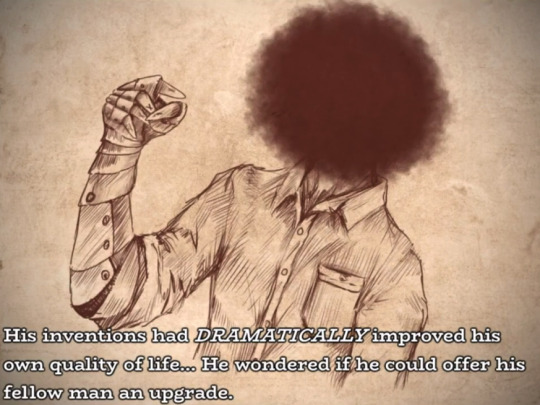
callum was obsessed with helping people, pushing himself to do more and more, because it was the only way he ever found respect. if he didn't help people and have grand visions for the world and make himself "useful" to society at large, then what would he be, if not a freak?
mingus and her paw-paw are very similar people, from their well-intentioned extremism, to their stubbornness and paranoia, to their inability to view themselves as anything more than a vessel for that grand cause they believe in (callum in the dialup, mingus in restoring her paw-paw's memory) - which is funny, because if mingus was able to view callum, and herself, as a flawed human person, she would come to understand how similar they really are.


:(
#babbles#dialtown#dialtown spoilers#mayor mingus#mayor mingus crown#callum crown#phonegingi#dialtown a phone dating sim#long posts#ableism tw#least surprising analysis post ever from the tttaac guy#started this. got embarrassed abt it. put it in my drafts. got really emotional about callum. returned to it. bon appetit
334 notes
·
View notes
Text
"I'd rather have you than three meals a day.": a thematic analysis
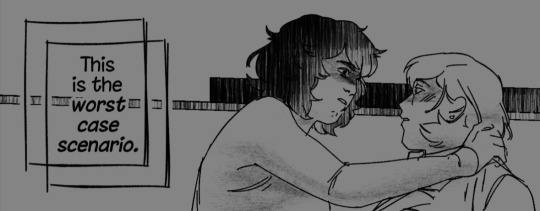
In February of 2024, a comic sprung up created by tumblr user Diesel (username rontra) based off of the Persona series. This comic, known under the title of "I'd rather have you than three meals a day." (which I will refer to as "failteacher yuri" for short), follows the story of two characters from the series: Isako Toriumi from Persona 3 and Sadayo Kawakami from Persona 5. These two characters find themselves entangled in each others' lives by complete happenstance, the comedic framing slowly revealing its fangs of intrigue and drama as more and more of both of their pasts come to light. Today, we will be discussing how the author explores themes of self-acceptance and facing one's past.
A small foreword...
As of the time I'm writing this, there are currently only 19 updates out so far of failteacher yuri, with a 20th on the way. I tried not to rush this analysis, but I also got really excited to write it! And also it's 4am!! So if I missed anything I am so so sorry...!!!
Next, I will be partially referring to characters in accordance with this chart, since this is important to the themes of the self in my opinion. Sometimes I don't specify. Bear with me a little please...
The True Self
There is the obvious point to start with, which is Toriumi accepting the fact that she is a lesbian. This is our beginning conflict in the story—quite literally in the very first page of the series—and it is the spark from which this story begins. As the story progresses, she grows more and more comfortable with her sexuality, trying more and more things with Becky.
The opening to #10 puts it quite well:
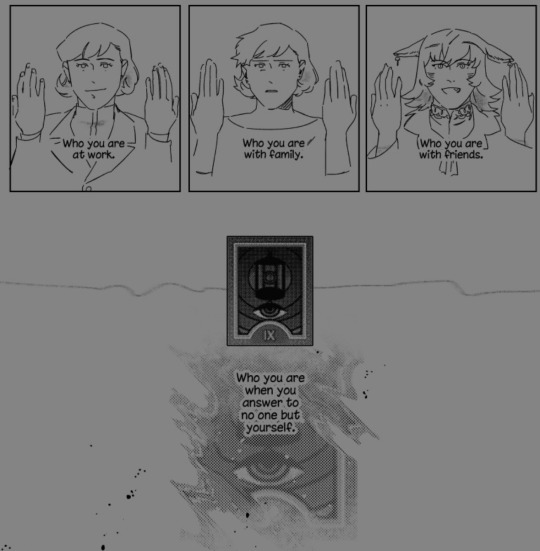
Toriumi is simply known by that when at work, a formal and polite guise. With her friends online, she's known under her username Y'ko. When fully alone, she is simply Isako. We meet her in the reverse order of this, knowing her first in a causal setting and graduating into higher grades of formality.
On Kawakami's side of things, we see that the idea of the persona is much more literal in the character of Becky. In a way, we meet her in the opposite way we need Isako, the difference between wearing the mask and having nothing to hide behind.
When she isn't under the guise of Becky and known formally at work as Kawakami, we simply are left with Sadayo. We meet her in this order, knowing her first with the mask on, watching it slowly slip as we begin to know more about her personal life.
These lines are neatly drawn for us and the characters at the start, the divide between these social masks cleanly cut. However, as time goes on and the relationship between the two deepen to new depths, the idea of the mask begins to mix with the true self, most notably in Kawakami's arc. As put nicely in #18...
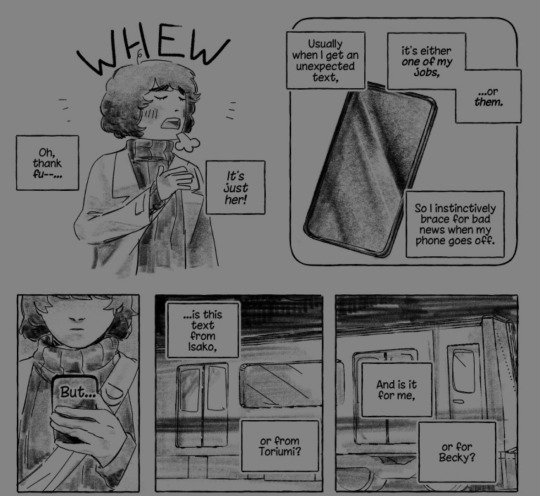
Comparisons to the Satoshi Kon film Perfect Blue have already been made by others, and even though failteacher yuri is noticeably different from the psychological horror story that the film covers, there are those elements of self-identity and the "real you" that make the comparison extremely interesting.
In the comic, it begins to grow increasingly more unclear for our characters which persona they're exactly speaking to in the moment—which words are intended for which mask, both to leave the lips of and fall upon the ears of. Which "you" is the "real you" if they all begin to feel the same—if the lines begin to blur?
The Burden of our Histories
Kawakami is the clear example of the two to start this section out with. The main thing Kawakami is hiding from Toriumi has to do with why she needs all of the money she scrambles for in the first place, which is revealed to us in #17.
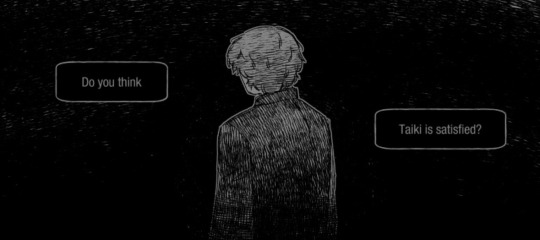
Kawakami has a secret to keep, and it's that she has been sending money to a former student's family, the student's name being Taiki. While in the comic it is unclear what may have happened to him, the usage of the word "forgive" implies that he had died, and that incident is either related to or has been blamed on Kawakami somehow.
The family demands money from her, more than her normal teacher's salary could possibly provide, so she turned to working at Victoria in order to make payments on time. With the tolls going up, though, who knows how long she can keep destroying herself...
But, of course, this isn't her only secret that she's kept. In #11, it's revealed that she took the Kanken at Level 1, the highest possible, and consequently the most difficult of all. At first, it's presented like it's an incredible feat, but this perception is shifted by Kawakami's own, believing it to have been something useless for the direction her life ended up going in.
The narration and informative boxes even begin to bend to the character's thoughts, becoming more and more unclear if the information the black boxes give in this update are objective or subjective, blurring the lines.

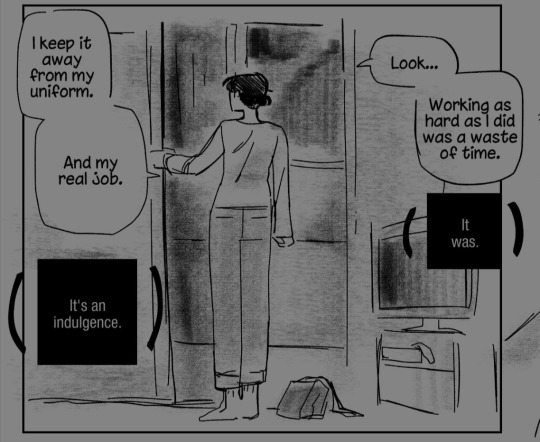
As much as Toriumi tries to hype up Kawakami and her accomplishments, the latter will simply never be able to see beyond her own self-perception.
Something that I also want to point out is how failteacher yuri utilizes onomatopoeia, creating a sense of pressure on our characters. It's almost comparable to the manga The Summer Hikaru Died, in which onomatopoeia is used to either create or alleviate tension in a scene, the sounds of the environments becoming almost deafening. The specific update from failteacher yuri I want to point towards is #18, which uses the sound of the rain in the background to create a barrier between Kawakami and Toriumi, with a side-by-side with a more recent update of The Summer Hikaru Died:
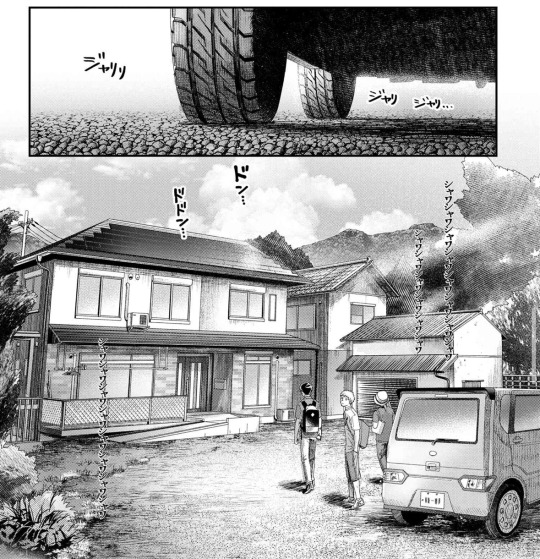
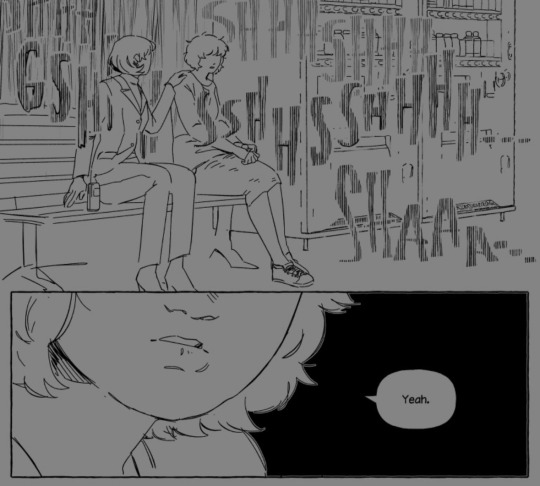
Kawakami isn't the only one keeping secrets, though. Toriumi, while much more subtle about it, is keeping a key part of her past hidden up her sleeve, and this has to do with the moon. Blink and you miss it, only overtly pointed out in update #13 and then much more quietly in #19, she continuously shows aversion to the moon, specifically the full one.
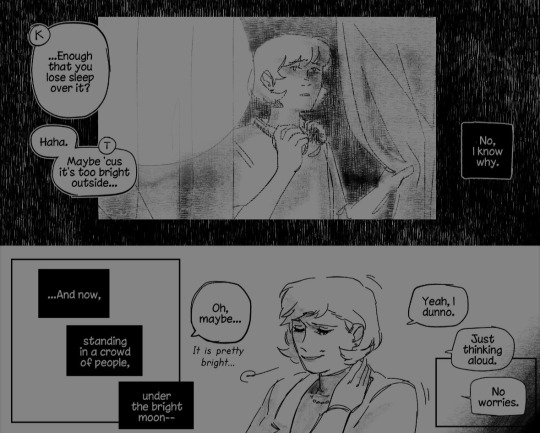
It's not like Kawakami hasn't caught on, either! During a small scene with Becky talking towards the audience at the start of #15 (the nefarious Becky is known to break the 4th wall), if you look closely, you can see that one of her notes reads "Scared of moon." I haven't played Persona 3 yet, so I can't give any fun lore insights, but what I do know is that the moon in that game is important and that Toriumi likely witnessed something she shouldn't have.
Additionally, there is also all of the stuff involving "A," which heavily has to do with Toriumi's arc of self-acceptance. Likely, something may have happened to "A" outside of Toriumi's control, and thus giving her a lot of complicated feelings about the subject. I personally don't expect a clear answer for what happened to "A," but it's still important to bring up.
Both parties are taking notice of where the other lets a part of their history slip, but neither have enough on them to be able to bring it up reasonably and not sound like they're taking crazy. Although, an inevitable tipping point is bound to be reached, especially with both of their troubles growing and growing. Something is bound to give.
How it comes together, in simple words...
Both Toriumi and Kawakami are dealing with very similar struggles, but they fight themselves tooth and nail on two different fronts, creating miscommunications and conflict between the two of them (and in some cases, outright lying). They are trying to navigate their increasingly dire presents all while their pasts haunt them, figuring things out and what they truly want from both themselves and each orher. What they want may not exactly be what they need, either, leading to further internal and external conflicts.
#13 succinctly states the ideas presented in the whole story so far, along with an amazing visual to boot:
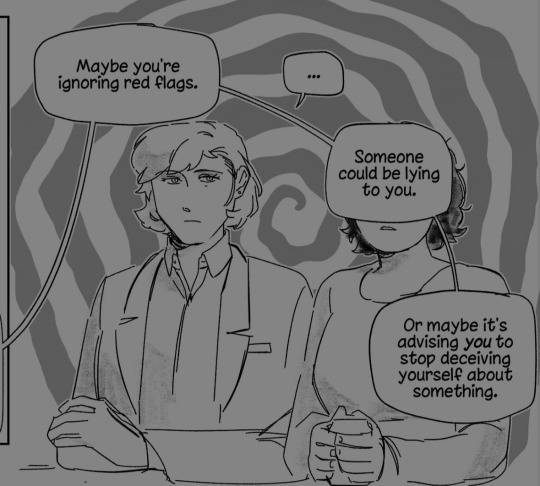
(I can't fit it here, but I highly encourage checking out the tarot meanings from #13 as well, which are linked at the end up the update, which you can view here.)
To put it simply, to lie to yourself and to others means to sacrifice, from relationships to self-perception. The only way to break free is to let go, to be your true self and to accept and face your past. The only way out is through.
#rambles#failteacher yuri NOW#I'd rather have you than three meals a day#persona#persona 5#persona 3#others art
132 notes
·
View notes
Text
My 2 cents on the plot / thematic relevance of Ch 95
This is not about advancing Plot B or showing Anya's school life (which is still true but has been discussed), but rather the overall theme of education and war. There was an excellent post about how Eden is at the frontline of the cold war and it is subtly shown through the innocent lens of the first graders (I can't find it now, would link it if I could). And I think that perfectly applies to Ch 95.
Quick recap on some references about education/students/war throughout the series (that I remember at the moment):
Sylvia gravely condemning the Berlint University Student Terrorists during the Doggy Crisis arc (Ch 20) and saying "did you learn nothing about war at your university?"
Henderson talking about his experience as a history teacher (Ch 27.5, Short Mission 4) and quote: "Yes, well, I have always maintained that there is nothing to be learned from the memorization of time lines. From the grand efforts with which our forefathers crafted society to the foolish notions that sent them racing to war, to not study the human element at history's root is to not understand history at all"
Note that Damian's best subject has been established to be history, and his family (father) has been involved in war, at least Donovan was PM during most of the war (established by Melinda in Ch 91). Donovan is also a graduated Imperial Scholar (Ch 64).
The Red Circus group started out as a peaceful student demonstration "advocating for peace and quality" (Ch 72) and "speaking out to protect the weakest members of our society". And Billy Squire said, "We were a respectable movement that fought for our cause with respectable means. It was the state that turned violent against us. So I'm not taking criticism from a member of the establishment (referring to Henderson, an educator). I'm gonna see to it that they reap what they've sown." Billy's daughter Biddy was killed by the state at a protest.
Less of a point, but Becky is the daughter of the CEO of a major military manufacturer. Despite their very likely involvement in military conflicts because they sell arms, the Blackbell cohort has been depicted positively so far: Becky being a kind, wonderful friend to Anya, Becky's father doting on her, and Martha again being kind and dignified (and also being an ex-soldier and acquainted with Henderson).
Eden Academy is a major setting for SxF and the themes of politics, education, and war are embedded in it. The students involved in protests/groups are older (the university students, Billy's daughter), but the political implications remain even among the youngest of the students— the first graders.
Hence, Ch 95. When mere first graders are shown to fight to gain connections, which can be political as pointed out by Henderson: "In the world of politics, dances serve as major social events". But of course, they are kids, so they see it more playfully and innocently, especially Becky with her shipper lens on.
Of course, there is also the aspect of getting to know other people better out of interest (the boys asking Anya and Becky to dance because they were impressed after the bus hijacking). But as people have mentioned, nobody mentions this to Damian despite him being equally involved in saving the class (all three of them got a star). The girls aren't interested in Damian as a person, they're interested in him as an asset because of his family and their power.
And I can see the teachers trying to diffuse the tension and create camaraderie with their friendly competition. To me, this reads as the teachers fully realizing "the battlefield of political maneuvering", and they want to remind the kids to have fun, to show good sportsmanship, to unite the kids, to operate as a class and be friendly with one another, and overall make it more lighthearted. It's nice to see the classes work together and get excited / win as a unit, especially compared to the more "individual" bits of fighting for a dance partner later.
We get a bit of comparison between Bill and Damian, with Bill showing good sportsmanship while Damian scoffs at him. But Damian ends up becoming ultra competitive and telling his classmates to not screw it up.
Like the Dodgeball chapter, Damian is clumsily attempting to lead the class by doing good in his quiz, while getting stressed and yelling at his peers when they don't succeed like he did. So he's not really a good leader. Like how him being good at history does not necessarily mean he is good at being peaceful (Short Mission 4 ends with Henderson staring in exasperation at Damian + Anya bickering with each other). But obviously, he is merely a child, and he is naturally immature.
At first Loid is all for advancing Plan B and analysed Anya's suitors in a rational (reductionist?) way by ranking them in terms of gaining intelligence, but he remembers this is just a dance, Anya is a kid, and she should do whatever she wants. Loid (and the adults) are very aware of the political side of the gala, but ultimately they want the kids to have fun and not worry / worry less about politics.
Because they're kids! They'll grow up and learn more and be politically active later, but right now, they're just kids. Kids who don't know much about the world but are eager to make the world a better place.
In the end, we get a panel of Anya and Loid "teaming up" to win Damian's hand for Plan B / world peace. The Damian-Anya dynamic is cushioned with the silly crushy feelings, but underneath it, Operation Strix continues to be a core motivation.
I find it interesting that Endo chooses to focus on the first graders and their innocent view of the world / politics. It's embedded everywhere and especially in a prominent school like Eden, but the kids don't really realise it / realise the severity of it. Heirs and heiresses are educated at Eden and grow up to have incredible influence and the power to shape the world. Our protagonist's best friend comes from a family that manufactures arms. Henderson mentions the importance of learning history to avoid making the same mistakes (ie. war).
So Ch 95 is a cute prom chapter. But I think it also helps to show the themes underneath the fun, bubbly interactions.
#spy x family spoilers#spy x family#spy x family manga#sxf analysis#meta#idk#what do i tag#long post
253 notes
·
View notes
Note
Hello!
This is random but I remembered your posts regarding The Situation with NG’s involvement in Good Omens when one of my followers on Twitter tweeted a screen cap of an old conversation on bluesky where Neil sorta confirms Amazon had pulled back his influence on production from S1 so there’s a lot of truth in what you said
Hope you’re doing great! ❤️❤️❤️❤️
Hi there! 💕 Hope you're doing great yourself. I usually offer snacks but this is a large sherry or Talisker topic so *gets the glasses*...
That's interesting info-- thank you for sharing it. Like I was saying in that original post, I don't know any of that for sure but that was definitely the impression I was getting. One of the several reasons I was getting that impression was due to other, equally unprofessional posts like the one you're talking about here that speak to already-existing conflict with Amazon long before this particular Situation became publicly known.
I'm not sure why he'd be trying to fight the studio publicly like that if there's not something happening behind the scenes. It's just unprofessional. I was shocked when I saw posts like that because it's not like he was being a whistleblower to egregious behavior or something-- he was bitching about his boss and the budgets to fans on Tumblr. It feels like he was trying to use the fanbase as a shield to keep himself from being fired, as a way of saying "you can't get rid of me-- I will tell my fans you are the issue and they will believe me and not you and I have a million of them-- just look at my little Tumblr thing. You'll lose money if you don't back me."
You know what kind of guy does shit like that? The same kind that tells young women that no one is going to believe them because he's a famous, award-winning writer and they're nobody.
If you don't mind, I'm going to use your ask here for a moment to add a bit to what I was saying about Good Omens being a through-and-through Pratchett novel because I think it's important to remember that this story has another author here. I've had some people ask me to expound on that a bit. So, for anyone interested, this is what I mean when I say that Good Omens is a Pratchett novel:
As most of you probably know, most of the posts I write about Good Omens have to do with the use of language in the story. The diction in Good Omens is extremely specific. Its quirky word choice, its "gayer than a monkey on nitrous oxide"- type of wordplay? It's funny on the surface level and it's a whole other level of funny when you dig a bit deeper. The cleverness there is familiar to Pratchett readers, as it's part of the distinctive style of his other novels. As a writer who is a bit obsessed with etymology myself, I spotted his love for it right away in his writing. It's in every. single. one. of his books that I have read and I have read quite a few.
The exact same thing is in Good Omens. It's a really specific way of writing where word-related jokes are the vehicle for the humor and etymology-based diction choices are chosen with great precision and inform the piece on every level. Pratchett's signature style of writing came from the fact that he used etymology as a tool to help him convey the messages in his writing. The thematic connections he was making were supported by the complex histories of the key words around which he was forming his stories.
For example, there's a meta one of you asked me to write about the halo in S2 and, when you look at the etymology of the word, as we're going to do in that meta, you'll see that halo comes from discus and discus is the root of discussion, the root of the word desk, and the ancient sport that is like ring toss. It was also the name of a threshing floor for oxen, which ties both to dancing and to the threshold of a door, like the bookshop entry. By the time we get through looking at this one, key word of halo, we're going to have taken this whole trip-- through other discs-- the magic ring trick, record albums, Velvet Underground cds, etc., through what it means to dance to the ox ribs to what it means to have (or not have) a desk to what it means to talk through your frozen peas to what's up with the invitations into the bookshop. Good Omens is not random. Everything is very specifically chosen to work together to serve an overall story that is structured around using the etymology of words to underpin its meaning.
This is just one example and it's the same thing in the novel and S1. Much of the S2 stuff connects back to S1 & the novel. It's a story that loves words and it's a story that is threaded together, thematically, through being told by using very specific words and their histories. Good Omens is written like a Pratchett novel and feels like a Pratchett novel because it centers word history in exactly the same way as Pratchett does in his other novels.
You know where that halo thru-line that connects everything came from?
Discworld. It comes from Terry Pratchett's Discworld.
The same, core themes in his books are being explored, just in a slightly different way, in Good Omens and, often, using the same words in the exploration.
Because that's the thing-- all of these posts I'm writing about wordplay in Good Omens? I could, if I wanted to, also be writing them about any one of Pratchett's other novels, and a lot-- and I mean a lot-- of the specific words being used in a big way in Good Omens actually overlap with Pratchett's other books.
One of you has been waiting patiently for me to write about Mrs. Sandwich and the seamstress-themed language happening in the show and, to do that? We're going to not only talk about her and what she stands for in Good Omens but we're going to talk about the etymology jokes Pratchett was making with The Seamstress Guild in Discworld. Mrs. Sandwich might have been new in S2 but seamstress language is not-- it's baked into Crowley & Aziraphale's speak back in the novel and, as you'll see, there are instances of it in S1 and the novel that only become more apparent once you know to look for them after S2.
When NG said that, back in the day, he and Pratchett decided that Aziraphale should have a halo that was like a ring toss-- no.
Pratchett decided that.
The idea comes from the wordplay that is literally *in the title* of his own book series. Aziraphale's halo is related to why Pratchett's series is the Discworld. It's the same ideas. NG has fuck all to do with it.
Think about how I was just saying that all this love of etymology that is in Good Omens is also throughout Pratchett's books and is the driver of his word choice in all of them.
Now? Ask yourself who came up with Crowley and Aziraphale's secret language. Whose idea was it that it be so punny and etymology-based?
Probably the guy who wrote all of those etymology-based, other books.
Who invented the rules for that language?
Probably the guy who wrote all of those etymology-based other books.
If Pratchett wrote basically nothing but intentionally, lovingly, word-nerdy books... and if Good Omens is, soup-to-nuts, a love letter to etymology to a point that its main characters have a secret language built around it, then Terry Pratchett is who really wrote Good Omens. He's the true author of the book.
There are even interviews that show they had much different takes on how the process for the book happened. Pratchett, in one of the ones I read, said he wrote more than 2/3rds of the books straight up on his own and that he'd have phone calls with NG before NG wrote his bits of it and something politely vague to the effective of 'editing over' when writing the next chapter. In the same paragraph where he said he wrote more than 2/3rds of the book, he also said with all that discussion happening "who can say" who really wrote what-- yeah, exactly. It sounded a bit like NG needed the phone call to be told what to write on his end and then Pratchett edited it/rewrote bits of it before he wrote the next bit.
It comes off sounding like this book was like a partnered school project where Pratchett was the diligent one who did all the work himself so it would get done and be actually good and then assigned a bit of it to NG to do that he then had to go and fix so they'd get a decent grade. I wasn't there so I don't know but that's a bit like what the Pratchett interviews about it sound like to me and I'm much more inclined to believe Pratchett's view on their process than I am NG's take.
All I know is that Good Omens was successful when it was first published and any even moderately successful book makes publishing houses jump up and say "MORE NOW" and if you were those publishing houses? And you had a popular project with two writers? And one of the writers became tragically ill? You know what you'd do?
You'd eventually ask the other writer to finish the series.
It is known that a trilogy was planned from the start, which makes sense because most books are planned that way. You actually have to rough outline the entire story arc and then divide it amongst the books first. The story already existed in full when Pratchett began to get sick. Never-- in over two decades-- did anyone ever go to NG and ask him to both honor Pratchett and make them some cash by writing the rest of the trilogy?
Not even with how popular this book is?
That seems pretty suspicious to me.
Like a 'they know NG didn't really write it' kind of suspicious.
When both the publishing houses and the tv studios seem to be doing handstands to minimize his involvement with it, I'm thinking it's not too wild to infer there that it's because he never really wrote much, if any of it, in the first place.
More to the point? They know he's incapable of emulating it.
Because he's no Terry Pratchett.
80 notes
·
View notes
Text
mentioning LOST's church ending got me riled up about the racism in LOST again lol. i obviously am aware that some actors just did not return to production for possibly other reasons, but also especially in the case of harrold perrineau (michael dawson) he felt like his character (and walt, his son) was treated like shit by the writing. and he was absolutely right. i've already made posts about this (will try to dig them up later), but michael was treated absolutely bullshit and unfairly wrt the story. michael betrayed them and killed two people, yes, but what did he do it for but to protect his son? he felt like nobody gave enough fucks about walt and there was some truth to that claim. his whole character arc is about being a dad to walt and their improving relationship over the course of being stuck on the island, so of course he would do that. it just makes sense.
which is why i don't think it's all that fair to punish him for it immensely in the narrative. harrold perrineau said it himself that he didn't want michael and walt to be another case of the absent black father stereotype [citation needed, i'll look for it but he said it in an interview] yet that's what he ended up being anyway. after his and walt's escape from the island, apparently walt cast him away because he doesn't agree with what his father did—which i actually think its interesting to explore: walt disagreeing with michael's actions and trying to grapple with it, but i don't think separating him from his dad was the best writing choice to make. walt is being punished for caring about his son by making his son be the one to cast him away. you can argue it's supposed to be tragic, michael is supposed to be a tragic character, but with the context surrounding michael's character? there's better ways to make his character be tragic than this.
which brings me to his next punishment. i was happy to see michael again on the kahana (just happy to see him in general), but it didn't last long when he gets killed, sacrificing himself to prevent/prolong the kahana's explosion from happening. (put a 📌 on this bc it's similar to how sayid dies and we'll come back to that later.) michael dies here and walt doesn't know about this. and then michael joins as part of the whispers, his soul trapped on the island (presumably forever) and that's why he's not in the church ending.
i'm gonna be frank. michael being trapped on the island because of his guilt or remorse or perhaps repenting for his sins is just bullshit to me. a lot of characters seen in the flash sideways and in the church ending are characters who've done "bad things". it's bullshit to have michael be the only one doomed to pay for his misdeeds forever. his misdeeds for... killing two people. not that killing two people is Nothing, but moreso if you examine the circumstances it's hardly anything to be damned eternally for.
remember the 📌 we had wrt sayid and michael? both of them died trying to prevent an explosion from reaching everybody else. which makes this more egregious imo. i can say 1000 things about sayid's arc (points to url), but this is about michael and not him, so i'll just focus on this: sayid was grappling with "being a bad person" for torturing and killing so many people. he worked as an assassin for ben. and yet, somehow, you're telling me sayid is not being damned eternally for his misdeeds but michael is? if you don't see the BS in that i don't know what to tell you.
i'm also aware why some characters don't appear any more re:conflicts with their actors (or just availabilities or other reasons for declining to come back), but even then arguably any conflicts with harrold perrineau stemmed from a justified place because of how michael was treated.
i think mr eko had a more dignified arc (he's one of my fav characters, thematically speaking) and honestly he had some of the rawest shit i've ever heard:
I ask for no forgiveness father for I have not sinned, I have only done what I needed to do to survive. A small boy once asked me if I was a bad man, if I could answer him now I would tell him, that when I was a young boy I killed a man to save my brothers life. I am not sorry for this, I am proud of this. I did not ask for the life that I was given but it was given none the less, and with it I did my best.
but despite this it doesn't change the fact that his absence in the church ending is very noticeable. he had meaningful connections with charlie, with locke, and interestingly like michael he kind of parallels sayid but this time thematically through their arcs. sayid is constantly burdened with feeling like he's a bad person and resigning to it as some sort of self-fulfilled prophecy, but mr eko is very firm about how he sees himself as not necessarily a bad man, just a man whose hands were forced because of the cards he was dealt. i wish we could have seen a more direct parallel between them, because it would've been interesting. back to the main point: i think it's such a missed opportunity for mr eko to not be here. especially since even after his death, hurley was able to communicate with his ghost, showing that he still had connections with his fellow losties even long after his death.
ana lucia being "not ready to move on" is interesting. but ultimately you can't help but raise a few eyebrows at it anyway. you can argue that, unlike mr eko she died an unresolved death, but most of the LOST characters died with an unresolved death. (she was killed early.) that's the whole point of the sideways segments. so what makes ana lucia so different from the others? yeah she killed shannon, but that was completely a freak accident. her people (the tailies) were being picked off one by one by the other so she was understandably on edge. she was kind of a hated character but i think a lot of it is just racism and misogyny combined tbh. (LOST is...notorious for a lot of misogynistic character writing decisions.) ana lucia was just as complex and morally "ambiguous" as the rest of them. i find the decision to make her corrupt in the sideways segments interesting (negative). cz like, there was never any indication she was like this in real life. what does that corruption symbolize? because obviously that corruption is a key to why she "can't move on yet". what exactly is she supposed to be repenting for? they hinted at a possible direction her arc is going towards before killing her off, ie. her ultimately choosing not to kill "henry gale" because she no longer wants blood on her hands. again, in a way, she's just like sayid! someone who decided they'd turn away from ceaseless violence. only right afterwards she got killed. so what does she need repenting for so much that she's left out of the church ending? much to think about.
i don't really know how to conclude this post. but my main point is that the lack of these characters during the church ending is and has racist implications. (again, i understand the casting issues, but it's still a writing decision you can critique as a viewer at the end of the day). i'll try to find the old posts i made last year abt michael and mr eko and their parallels to sayid and link them here (and self reblog).
edit: go read/look up "burn it down". it details a lot of the behind the scenes mistreatment of the staff (including racism and sexism), including actors and writers. the quote from an interview from harold perrineau that i mentioned was also linked in a reblog. (post link)
#op#lost#lost abc#abc lost#lost 2004#<- have we agreed on a main tag yet#michael dawson#mr. eko#ana lucia cortez#meta#analysis#media analysis#church ending#//#lostposting#<- my tag for LOST rambles on this blog
127 notes
·
View notes
Text
Echoes and Hunters are really interesting to me because of their place relative to the rest of the series, as basically the closest thing to being self-contained Filler Episodes in Samus's life. It can be argued the Prime games as a whole are a filler arc, what with how you really don't need to play the Trilogy to understand the 2D games' ongoing narrative. Even so, it is still a whole arc within itself; despite being decent standalone titles, the phazon connection spanning all three enriches them in conjunction with one-another, and Corruption in particular leans a lot on the setup the first two provide.
Yet at the same time, while definitely connected to the other two, Echoes is distinctly the odd one out in a lot of ways, and the overarching phazon storyline seems almost incidental at times despite Dark Samus and the background setup of the conflict. It's not confirmed either way, but the dark world could be read as a pocket universe created by the leviathan seed malfunctioning, or a whole parallel dimension that it simply broke through into and created the copy of Aether within. Even if it is the latter, the Ing were probably a byproduct of the interaction of Phazon and the dark dimension, but there is also the possibility the were a distinct entity existing beforehand. Regardless of all of that, the Luminoth and Aether as a location certainly stand out as unique, and are only loosely connected to the bigger picture through a shared history with the Chozo.
Hunters, meanwhile, may wind up tying into Prime 4 through Sylux, but that too is extremely incidental to the main story focus, which is even more outright disconnected from the usual Metroid factions and concepts than even Echoes is. As people have joked about before, it really says something that killing Gorea, a terrible eldritch abomination that singlehandedly wiped out an entire galactic-region-spanning civilization, is probably one of the least important things Samus has done in her career. Even that aside, apart from Sylux and Weavel, most of the other hunters are similarly unique and disconnected from the established story, with Trace and the Kriken Empire in particular standing out as an elephant in the room that are weirdly less relevant than the info on them would imply.
And I love the overarching storyline, both of the Prime games and the series as a whole, and how the different mainline titles are for the most part thematically enriched by their interconnectivity and parallels. (Even Proteus Ridley, for all the problems I have with him, I do appreciate as a clear bridge between Corruption and Super.) But there is also something really fascinating to these two more avant-garde titles, that really expand the universe and try new things, instead of remaining confined to the core concepts the series usually keeps a tight focus on.
There is a risk of going too far and possibly losing sight of the aesthetic/thematic shore, so to speak, but I feel like we're not quite there yet, and I appreciate the effort to branch out. On the flipside, there is again some weirdness to some of this stuff being so confined instead of having a bigger impact, (looking at you Trace) but the level of tightness of the mainline games does kinda work in our favor here. Sure it's weird, but it's not out of the realm of plausibility that the Kriken really are a big deal, but just... elsewhere, and mostly haven't directly relevant to Samus's life outside of this one-off run-in with Trace.
Idk, I'm not really going anywhere in particular with this, I just think it's neat.
#not a reblog#metroid#metroid prime#metroid prime 2 echoes#metroid prime hunters#rambling#samus aran
66 notes
·
View notes
Text
chapter 142 thoughts!
HEADS UP: In this review I discuss fictional depictions of sibling incest as well as a brief reference to both fictional and a real life suicide. As usual, feel free to skip if you're not in the right zone and I'll see you next time.
thank you for the kind words from everyone when i was still in the Slime Era of feeling sick lol. i'm like 80% back to full power now!
I'm gonna be totally up front and say I really think this is one of the worst chapters we've gotten in a while but here's the twist: it's not for the reasons you probably think!
We're following up basically right off the back of last chapter and immediately I am kind of mad at how shitty the series is continuing to do Miyako with regards to the movie arc. She was a total non-factor in the RBKN conflict and now that Aqua and Ruby are being pressured into doing something they have both verbalized that they don't want to do she's just like well gosh i feel complicated but what can i do :(. Having the setup almost 20 full chapters ago of Miyako expressing that she wants to step up and do more for Aqua and Ruby as their mother and then having her completely failing to intervene on their behalf here is just wild.
In general, the way everything is being set up to force this kiss feels so… well, forced. Even if Kaburagi (as the story says) insisted there be a kiss scene, there are a million ways to fake a kiss that doesn't involve actors actually kissing. Body doubles! Camera angles! Putting your thumbs in the way! Unless Kaburagi said "I want 20 full seconds of Kamiki sticking his tongue down Ai's throat center frame", there is absolutely no reason "a kiss scene" needs to mean "these two blood related twin sibling actors actually kiss". The whole thing is just so incredibly contrived.
And honestly? The fact that both Ruby and Aqua have expressed a 'no' and are being forced to do this anyway is the part of this chapter making me the most actively insane. It is absolutely mind boggling to have spent half of last chapter on a Miyako monologue about how immoral and unethical it is when people's ability to give informed and sincere consent is compromised by the entertainment industry and to then follow it with a whole chapter of basically every character we're supposed to like flaunting a total lack of respect for Aqua's comfort and consent in this regard, up to and including the completely insane scene of two adult women lecturing Aqua about how he isn't allowed to have boundaries. What the fuck is going on here!!!
This is especially frustrating because I actually really like a lot of things about the scene with Yoriko and Abiko… even if there's some stuff that really kind of broke me lol. Like uh, wasn't it a really huge plot point in Tokyo Blade that a mangaka couldn't be expected to turn out an entertaining theater script because those are two entirely different kinds of storytelling…??? But whatever.
Off the bat, I have really mixed-leaning-negative feelings about the reveal that the KamiAi romance scenes we'd gotten were entirely fictional. On the one hand, I actually feel pretty validated - I had guessed that the full-immersion-flashback presentation was a hint that we were being presented with a falsehood and it implicitly confirms something I've been saying from the start that 15 Year Lie's version of events has to be taken with a grain of salt, both because it contradicts known events and facts and because so many other people have interfered with it. Having that made textual and being able to confidently say it helps a lot in discussing what this means for the story.
But like… that means we wasted a whole bunch of time on shit that was made up and didn't matter! Like, thematically speaking, I think this is potentially interesting but I just keep getting stuck on the fact that we were given a super interesting scene finally fleshing out and giving us info about both a character and a relationship we've been absolutely starved for details about, only for the story to turn around not two chapters later and go "and my source? i made it the fuck up". It just totally dashes all the enthusiasm I was feeling and it also makes it way less rewarding to try and dig into what 15YL is doing when at any time, all of this potentially interesting character work could be revealed to be total piss in the wind.
Stepping back from that… in total isolation from everything else, I do think this talk with Abiko and Yoriko about what it means to write stories is interesting from a lot of angles. While I don't think these two are the 1-to-1 author avatars for Aka and Mengo fandom treats them as, they nevertheless clearly serve as reflections of the two's experiences and viewpoints about the manga industry and specific and the art of storytelling in general, allowing the story to play around in the quasi-metafictional space it does sometimes, where it uses in-universe fiction as a method of commenting on itself.
In that sense, I think Yoriko can be understood as speaking for Akasaka here and discussing some of his feelings as a storyteller of Oshi no Ko specifically. OnK has never made a secret of the fact that it's drawing on Akasaka's real experiences in the entertainment industry but perhaps less obvious to overseas fans is the inspiration it takes from real life issues in contemporary Japanese pop culture, too. Infamously, Akane's arc very transparent drew inspiration - if it wasn't reconstructed entirely - from the suicide of Hana Kimura, not even six full months after Kimura's death. When the anime aired, Kimura's surviving mother (imo, rightfully and deservedly) lambasted the series for using her daughter's death as the fodder for entertainment without consulting her surviving family. It wasn't even that she disagreed with what the series was saying - she just wanted someone to have some consideration.
This is what Yoriko means when she talks about the responsibility a writer has to their stories. When you write a piece of fiction as highly visible as Oshi no Ko currently is, it is your responsibility to consider the impact your words will have on the world. No, fiction does not directly impact the real world in a physical, tangible way but if we are careless with our stories, we can regurgitate and perpetuate dominant cultural narratives that very much do cause real, tangible harm to marginalized people. Hikaru Kamiki isn't a real person, but there are undoubtedly people in OnK's readerbase who see their experiences mirrored in him. Airi Himekawa isn't real, but people like her exist. Akane Kurokawa isn't real but Hana Kimura was.
This discussion also serves as an interesting warning to Aqua himself, though maybe not quite in the sense Yoriko intended. Aqua's revenge has always been something treated, in-universe, as a sort of fiction in of itself; Aqua calls it his 'revenge play' and his primary method of pursuing it is to become an actor. It's a retribution narrative about real people and Aqua is its author. But as Yoriko reminds him… stories can kill. Especially ones featuring real people. Aqua has been telling himself a comfortable lie for years that only he will be hurt by his own inevitable self destruction but Yoriko reminds him that he isn't the only person involved here and that he is inevitably going to cause great pain to the people he loves if her continues down this path.
That's why this chapter is so frustrating. This is all good, meaty character work with some great thematic overtones… and it's all in service of contriving this scenario where Aqua has no choice but to tongue his sister on camera and for some reason, nobody is pointing out the million and one alternatives to this deranged scenario.
But anyway. Enough beating around the bush: let's talk about That Scene. And despite what everything I've said this post might lead you to believe… I actually really like it.
I don't know exactly what activated to make her go sicko mode but Mengo has been really on fucking fire with her art on the series lately. It really jumped out to me in 137 but she's honestly been cooking since the very start of the movie arc. It stands out especially strongly in Aqua and Ruby's talk on the balcony in ways I really vibed with. The whole scene feels like Ruby's shoujo brainrot and the cold reality of what she's tiptoeing around suggesting to Aqua are battling out for dominance over the framing. Ruby's stubbornness is such a force to be reckoned with that it almost wins entirely but there are moments where the lens cracks and we see things as they are. Aqua's discomfort practically radiates off the page this entire conversation.
Not only that but… jesus christ, Ruby. Just look at how she's framed when she first enters the scene.
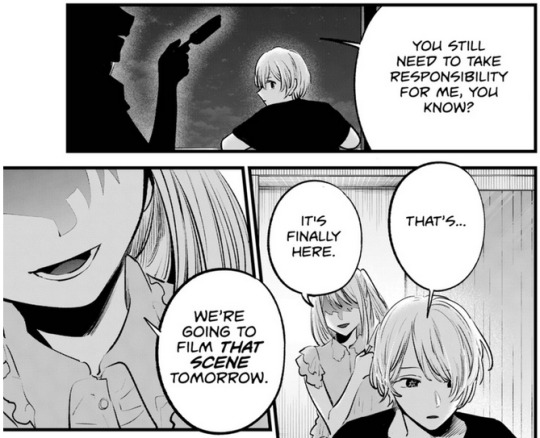
That oppressive silhouette, her shaded eyes and that sinister smile… I probably don't need to tell you that's NOT how you typically frame a romantic heroine. She honestly almost looks more like a villain.
But Ruby quickly reasserts control over the framing. Or rather, what she's suggesting is such a sugary shoujo fantasy, the framing has no other option but to comply. At last, Ruby steps out of the shallow channel of plausible deniability and puts into concrete words what she has been thinking and longing for these last twenty chapters: for her to retake her role as Sarina Tendoji and for Aqua, in turn, to play Gorou for her once again. More than that - she pushes him for a concrete response to her love at last, not as Ruby but as Sarina; not only does the paneling repeatedly cover the eye with her star but in the final panel where she unambiguously propositions Aqua, the star is completely gone. This is what Ruby is offering: to completely sever her connection to Ai and the new life she has built on that foundation and to return to being Sarina, if that is what the doctor she loves wants.
This is SUCH an incredibly effective scene. It's excellently done and the art is fantastic. It finally draws out and makes explicit the underlying disconcerting subtext that has been swimming under the twins' relationship since 123. It works fantastically well… in isolation. But when taken into the context of the rest of the story it just feels so… unearned.
For the last 20 chapters, we have had absolutely no serious insight into Ruby's feelings re: the reveal of Gorou's new identity as Aqua. We didn't see her grapple with it or have to adjust to it at all. It was like a switch flipped in her brain and she was suddenly a 2010s fanservice imouto splooging about her oniichan. Her interiority in this regard is completely absent. Whenever the subject is addressed at all, it is made into a joke with Ruby as the punchline. There has been no serious build up to this moment or any meaningful time spent on Ruby's feelings about Aqua and as such, being asked to take it seriously now feels so incredibly jarring.
I've said this over and over in other places but I'll make this clear here: the handling of Ruby's feelings is not bad because Incest Is Morally Bad or whatever. At the end of the day, OnK is fiction and fiction is a space that allows us to explore ideas and scenarios that would be unpleasant, dangerous or even downright immoral to try and interrogate in real life with real people. Not only that, but AQRB's situation is so far removed from anything any real person could experience there's very little risk of it acting as a harmful reflection of a real person's life. But because OnK had the space to do just about anything with this idea, I'm so incredibly baffled that it chose to do all of nothing. This is a plot point that has been cooking since the literal first chapter of the entire series and now, just under four years and over 140 chapters past our starting point… and this is the best Akasaka can do? Dated brocon humor that reduces Ruby to a shallow gag character, denying her the opportunity to have deeper, more complex and ugly feelings and denying her the respect of examining those feelings with honesty?
It sucks. This whole thing really sucks. As someone who loves Ruby so, so much… this really just feels like an insulting way to have handled what should have been one of the most interesting and engaging parts of her series long arc.
I do think this chapter is the beginning of the end of AquRuby's time in the endgame couple race, if it was ever seriously in the running to begin with. Ruby embracing Aqua with a proposition in those final two panels echoes Akane doing the same in chapter 72 and the fact that this cliffhanger ends on the proposition and not a kiss implies to me, structurally speaking, that we are heading for a rejection. On top of that, we're pretty far away from the manga's ending still and Kana's romantic resolution with Aqua hasn't gotten its time to shine. All those factors together makes me feel pretty certain that this is the final nail in the coffin and we're just waiting to see how Aka sticks the landing.
After all - Ruby is asking for his response as Sarina. And if this is Sarina asking for his love one last time… we already know how Gorou's going to respond.
65 notes
·
View notes
Text
Thinking about Shikiaki bloodplay rn and I have written about it in a fic before, but I feel like I never properly expanded my thoughts on that, so I'm writing about it here lol
(kinda writing this up on my phone so sorry if my thoughts aren't coherent or well-written)
I think what I like about bloodplay in particular for Shikiaki is that it has some narrative significance in terms of its implications for Akira's character. Akira's entire backstory revolves around how he was a test subject/experimented on, and Akira starts feeling conflicted about his own existence when he notices how his blood has a deadly effect on Rein users. He starts hating himself for his blood and calls it "cursed". (And like, blood is an obvious important and recurring motif in Togainu no Chi; it's right there in the title of the game lol)
There's a scene in Shiki's side story where Shiki licks up the blood from a wound on Akira's wrist:

Akira gets turned on when he sees Shiki doing this act of possessiveness, and while the text in Shiki's side story kind of glosses over this moment, I personally like to view this scene of Shiki taking in Akira's blood as a metaphor for Shiki accepting Akira for who he is. (There's no textual basis for what I'm saying here; it's just my headcanon, but I feel like narratively, it fits in with the rest of Shiki's route lol).
Like... the last time someone ingested his blood (Keisuke), Akira saw how deadly his blood was and started hating himself for it. But during this scene, Akira isn't really even thinking about the consequences of Shiki ingesting his blood. Of course, he knows that Shiki isn't on Rein so there isn't any danger, but it doesn't take away from the fact that Akira isn't focused on his cursed blood during this moment, but rather this "raw possessiveness" he feels from Shiki.
And speaking of possessiveness, during the tunnel scene, when Akira asks if Shiki's going to kill him because of his blood, Shiki replies with this:
"You're mine. That's all there is to it."
And this stuns Akira, but it also makes him feel strange. Shiki wants him in spite of his blood. It's the defining moment where Akira realizes that Shiki accepts him for who he is. While Arbitro/Emma & Gwen/the Japanese government were only interested in Akira for his blood, Shiki instead wants Akira for who he is as a person, and doesn't care about the implications of his blood.
And that's why Akira chooses to follow him.
(man I just love how Shikiaki has so many moments that tie in together thematically... 😭❤️)
18 notes
·
View notes
Text
A Song of Love and Loyalty (and Loss): General Miyana
So thanks to @raayllum I have been thinking about Miyana. Miyana is a very interesting figure in the cast of a story where the central conflict is shaped around what an individual will do for the sake of love, whether to themselves, to others, or to the world—because Miyana, in her initial arc, is characterized by what she won't do for love. She's very much a facet of the same theme, but in a way that people are liable to find unsympathetic: she doesn't support Karim when he's relatively harmless, to the point that could be considered a betrayal of him, but then she does when doing so means doing serious harm in a definite betrayal of "the good guys."
But I love a complicated woman, so why not do a deep dive on the motivations, story arcs, and thematic future of a character most of the fanbase probably can't name and most of the rest likely hate?
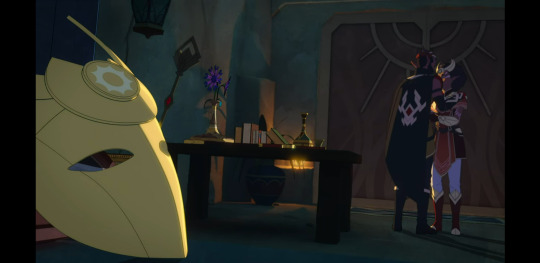
So What is Miyana's Deal?
Miyana is one of the "Six Horns," the best and most respected of the Sunfire generals, named for the six horns of Sol Regem. The Six Horns, as at least part of their duties, form a tribunal that is is implied to be the highest level of Sunfire justice. Their role appears to be determining innocence or guilt, and the sentencing is left up to the monarch—however, they are also powerful enough to completely displace the monarch if they unite in intent to do so.
In their role as judges, the Six Horns adopt ceremonial regalia that hides their emotions and gives at least a symbolic curtain to their identities, creating a sense of impartiality... but it does not appear to be any kind of secret who they are. Miyana is still one of the Six Horns when out of "uniform," and she and her colleagues freely mingle and discuss things among themselves.
From her role, we can assume that Miyana is smart, politically astute, likely good at reading both people and situations, and has demonstrated loyalty to the Sunfire kingdom (... empire?). It's difficult to tell whether being a warrior is also part of her skillset, because she doesn't demonstrate any combat ability or inclination in her appearances—ex. she does not walk around armed. The "general" title would seem to imply some amount of combat experience, especially with our one other "general" example being Amaya, an extremely hands-on commander. However, given the intertwining of government and military there appears to be in Sunfire elf culture, the position is more strategic and advisory in nature than front-line combatant.
Miyana and Karim: a Secret vs. a Symbol
Miyana and Prince Karim are engaged in a romantic relationship that is secret... but also not particularly subtle, at least on his part.
When Karim bursts into Miyana's... office? Quarters? Whatever, she's the one who is disturbed and slams the door behind him. He doesn't really appear to give much of a shit.
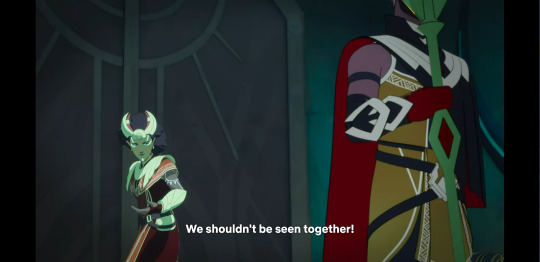
This makes sense, because Miyana is the one with something to lose if their relationship gets out. She's meant to be an impartial judge, even against the monarch—an entanglement with the royal family significantly compromises her. Presumably, if she wanted to be with Karim openly, she could relinquish her position... but she does not, either because she doesn't want to, or because Karim doesn't want to make things official.
Speaking of...
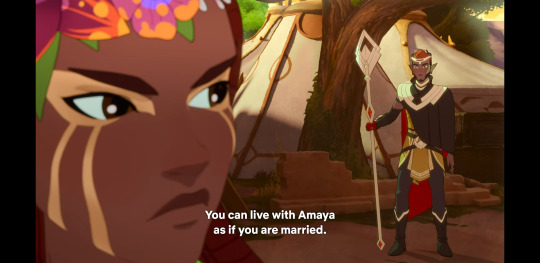
Karim, somewhat hilariously, suggests to Janai that she keep Amaya as a permanent consort, rather than officially marry her and have that marriage be a "symbol" of what he perceives as the beginning of the end for Sunfire power and culture. This suggests that it could be Karim who insists on maintaining secrecy over his and Miyana's relationship, assuming he feels the same way about making sure his own eventual marriage is appropriately symbolic for his people.
Personally, given the way Karim behaves, I think it's Miyana who isn't willing to abandon being one of the Six Horns for him—whether because of the power and status it affords her, or because she values being in a position where her service to her people has a strong impact, or because it took her a fucking long time to climb the ladder. Who knows.
But basically, Karim? Not subtle:

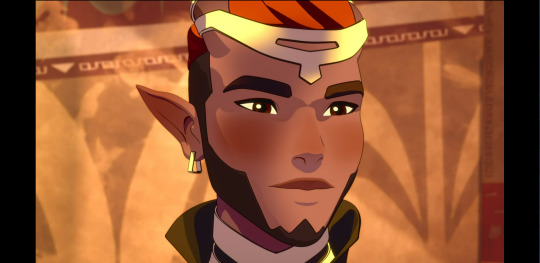
Look at this guy, he might as well have literal heart eyes. He also doesn't avoid openly socializing with her:
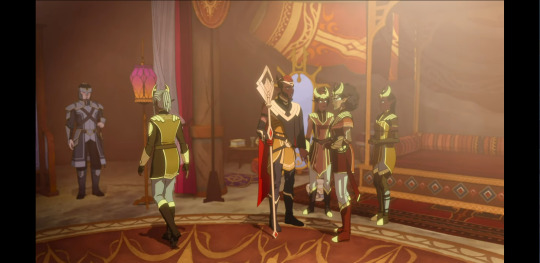
Not to mention that they have matching earrings, for fuck's sake.
Anyway, he doesn't even respond to Miyana's concern about them being seen together when he barges into her space. He's not exactly behaving as if he's committed to the secrecy.
Season 4 Arc: Gently Convincing Your Royal Boyfriend that He's an Idiot
Miyana is introduced in the s4 Sunfire arc when it pivots toward Karim moving directly against Janai. Immediately after being dissatisfied by the result of Lucia's trial and Janai revealing the Sun Seed to him, Karim meets with Miyana and their relationship is revealed to the viewers. She does appear before that, with Karim (the three previous screenshots are from before that point), but this is where they are formally connected.
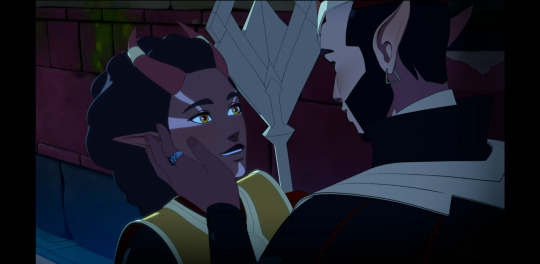
This scene, immediately before Karim tells her that he has seen "the truth" that Janai must be removed, is the last time we see Miyana smile until the end of s5. She spends the entire rest of the season going through various stages of concern and doubt about Karim's... frankly unhinged plans.
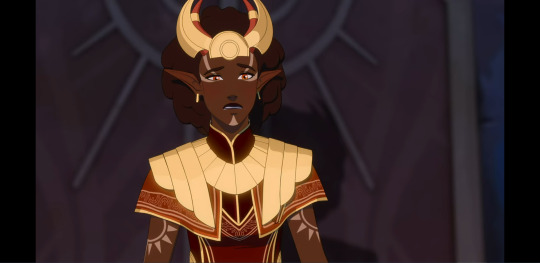
She questions him at basically every turn, but never goes so far as to say outright that what he's proposing is a bad idea. She acknowledges that the others of the Six Horns might be sympathetic to his take on Janai's direction, but more than once cautions him that she does not believe they will be willing to turn against her.
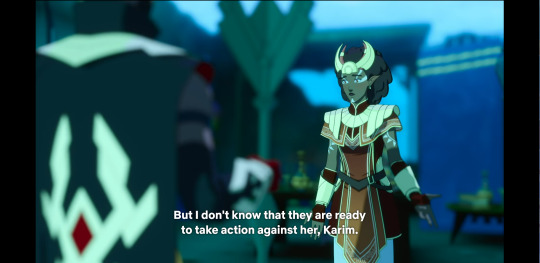
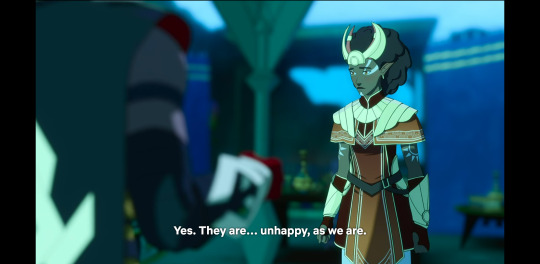
So how does she really feel? Karim certainly implies that he sees her as his "woman on the inside," secretly feeding him information on the Six Horns and influencing them in his favor, in turn. There's a cut segment that has been referenced in interviews in which Karim cautions Miyana that she must not be the first to vote in his favor, because that will possibly reveal their relationship—which, while he may be thinking about her preference for secrecy, would also kind of invalidate the entire vote.
Miyana, on the other hand, expresses a lot of concern for Karim. She's very worried that he's misjudged the situation and will fail—possibly because she knows she cannot rescue him if he's wrong. And she doesn't, even when he cries out to her, specifically:
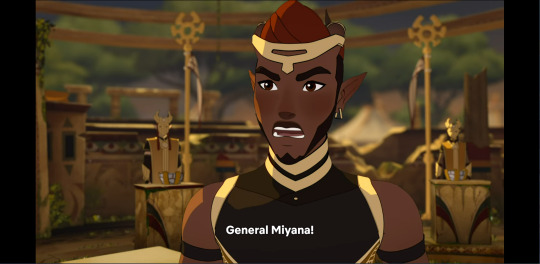

I bet that was real fun for her to try to explain. It's possible she could have helped him more after the fact if he hadn't implicated her that way, but it's also entirely possible there's nothing she could do—the monarch, after all, is the one who sentences the guilty.
Even if Miyana is 100% behind Karim's vision for the future of the Sunfire people, at no point does she appear to agree with the way he's pursuing it, and in the end she refuses to go down with him. (Contrast with, say, Sarai... who firmly expresses her disapproval to Harrow about his approach, but then backs him 100% with action.)
Season 5 Arc: Can You Even Trust Yourself?
Miyana does not appear a single time in s5 until she reports Kim'dael's infiltration of the camp to Janai. At this point, Janai entrusts her with concealing and protecting the Sun Seed.
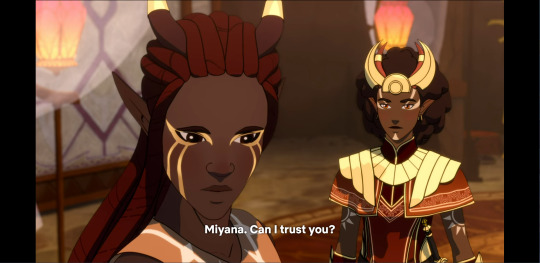
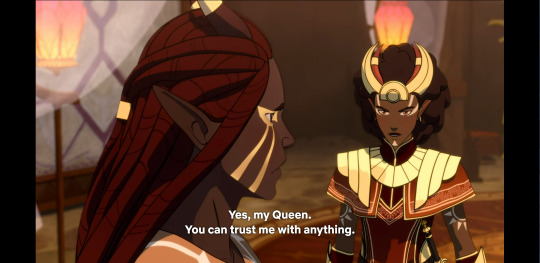
This is an interesting exchange, since on Janai's end it indicates that she and Miyana probably don't know each other well. Janai at least suspects what they are facing, based on the description of "a ghost"—if she suspects that it's Kim'dael specifically, she would be aware that the only person who could have sent her is Karim. It's not clear whether some of Miyana's involvement with Karim might have come out after s4, but even if it did, it was probably brushed off because she didn't stand with him in his ill-judged coup.
Also, like... what does Janai expect her to say? "No"? This isn't really a question—Janai has decided that, absent other immediate options, she can trust Miyana as a member of the Six Horns to safeguard the future of their people. She's indicating to Miyana that she is being given an incredibly important, secret responsibility.
And personally, I fully believe that Miyana thinks she is being 100% truthful in her answer. I don't think she's been sitting around waiting for the perfect moment to run off to Karim—she loved him, and still loves him, but she chose being able to continue having a role in shaping her people's future over throwing away everything for him. She has no idea where he is or what he's doing. He's gone. Exiled. No longer a factor.
So what changes? The ransom demand:
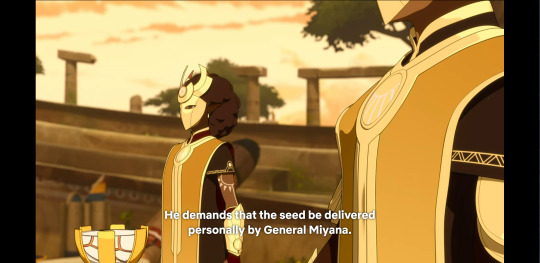
Karim sends Pharos with a message that says, simply:
He has Janai.
He wants the Sun Seed in exchange for her life.
He wants Miyana to come to him with it.
For Miyana herself, this potentially changes everything, because what she's hearing is:
Karim is alive.
He is still fighting for his vision, and has gathered allies powerful enough to overcome Janai.
He has some kind of plan requiring the Sun Seed, which likely plays to his actual strengths (he's a mage, the Sun Seed is a powerful magical artifact).
He wants her at his side.
Personally, if I was her, I'd be at least a little worried that he wants her as the delivery person so he can punish her for her betrayal of him... but he's also such an unbelievably soft boy that I can see why that might not cross her mind. Like, his reaction to seeing "Miyana" riding toward him is unrestrained joy and affirmation that his belief in her was correct—if anything, what he's expecting here is that Miyana will convince the others of the Six Horns to agree to his demands, thereby getting him the Sun Seed and reuniting them.


Miyana, for her part, is now in a position to significantly shift the balance of power. She still loves Karim, and she presumably still believes in his direction for the future. She can bring him the Sun Seed. She can bring him her segment of the Sunfire army. Both of those will significantly weaken Janai's position, while putting Karim much closer to success. Unlike Karim's s4 plan, this is a good bet. This is worth throwing away what she has, in favor of something she could gain.
Removing the Mask: Miyana's Final Turn (So Far)
Bear with me for a moment, because we're going to briefly circle back to s4 and Miyana's position as one of the Six Horns. Throughout s4, there is demonstrable tension between her role and her relationship with Karim, for both of them:

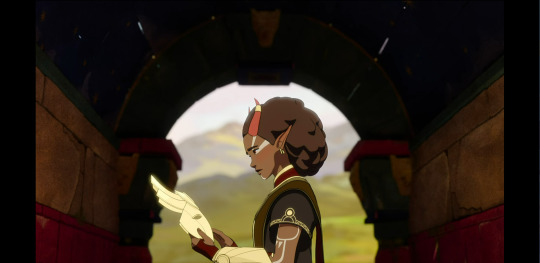
Each of them, in a private moment, contemplates the mask she wears as tribunal judge—a symbol of what keeps them apart. Both of them know that this is her central choice, between her love for him and the duty (loyalty?) to her people that she won't let go. Karim, poor fool that he is, thinks that those will never come in conflict. Miyana spends all of s4 knowing that they will. Maybe even knowing what her choice will be.
In Amaya's deception to rescue Janai, she puts on Miyana's clothing and mask, pretending to be her in order to get close to Karim. Karim completely falls for this, and thereby suffers a second emotional betrayal from the "General Miyana of the Six Horns" mask.


He's so happy that his faith in her wasn't misplaced, and then he gets literally hit in the face with it:
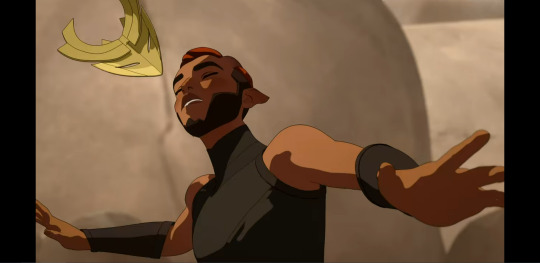
So that sucks for him. However, when Miyana ultimately returns to him, she has stripped all aspects of her Six Horns role, wearing neither her tribunal mask/robe nor her usual fancy tunic and adornments (what Janai was wearing):
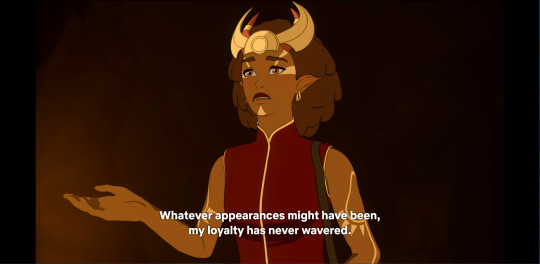
She professes her loyalty to Karim having only the most basic layer of her personas: the bottom-layer red tunic and pants that go under both outfits. She has, it is implied, completely discarded the position that previously held her back from Karim.
She also claims that her loyalty has never wavered (debatable), and equates her loyalty to Karim with her love for him, also unwavering (probably true).
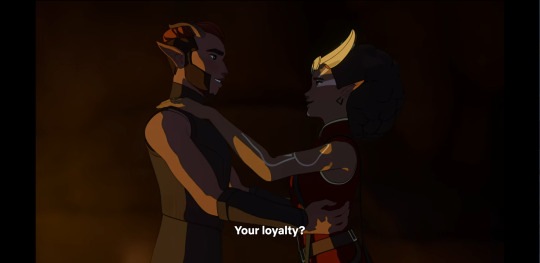
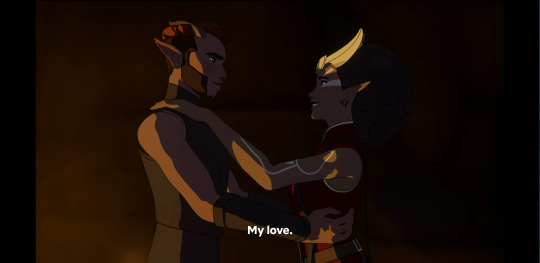
This, the moment when Karim receives her (after literally starting to cry), is the first time she smiles again. She continues to smile through the end of the sequence, revealing to him both the Sun Seed and the army she has brought. She appears to have zero conflict about this—she has shed it all with the shell of her identity as one of the Six Horns.
So What Does This Mean for the Future?
Miyana has explicitly equated her love for and her loyalty to Karim. And what is love, in this series, but something to be tested?

Even having stripped away all the aspects of her dedication to her people that are related to the Sunfire mainstream rather than Karim's rebellion, Miyana is still going to have to reckon with whether Karim's vision is the future she wants and whether she can support how far he may go for it. She has handed Karim, and by extension Pharavos, a great deal of both magical and martial power. When Karim's ambitions collide with Aaravos's, he will almost certainly double down—accepting what Aaravos offers and/or foolishly believing he can somehow come out on top.
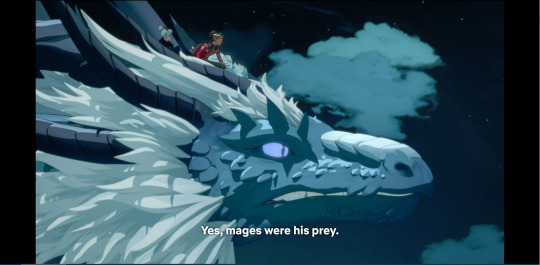
Miyana is the only one of this trio who is potentially even a little clear-eyed, though she could absolutely be blinded by love. She may follow Karim to the bitter end and self-destruction. She may try to save him. She may try to save others from him. She may realize she can only save herself.
Of the characters with close relationships that carry this loyalty/love tension of loving someone but not necessarily being able to support their decisions and actions, we have:
Soren, who was unable to continue following Viren's downward spiral and instead chose loyalty to his king. His father may be a lost cause, but he still believes he can save his sister.
Terry, who has been left by Claudia with the aggressive guilt that she has robbed herself of his support because she believes he will eventually abandon her, and has several directions he could go: doubling down on his loyalty to Claudia and aggressively following her descent, prioritizing his love for Claudia and focusing on finding a way to save her, or he might cut his losses and fuck off completely (unlikely).
Lissa, whose precise situation we don't know the details of, but who left behind everything she loved and never looked back (or was never allowed to).
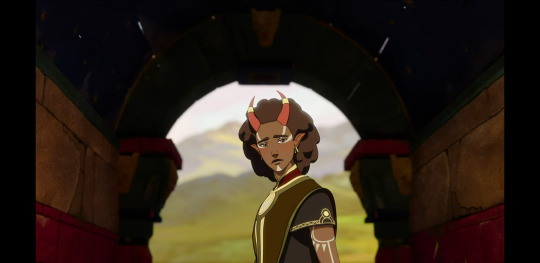
While I'm sure whatever resolution they write for Miyana will be fine (*grits teeth*), at this time I think the best one for her would be a Lissa-style ending. Janai's path may lead to the end of Sunfire history, as Karim put it, but his path will lead to the end of their future. Miyana will eventually recognize that, and that like in s4, she can't save him from himself. However, this time she has already irrevocably cast aside her former position—leaving Karim also means giving up her chance (or perception of her chance) to be someone who actively shapes and safeguards her people's future. If she returns to Janai, she faces exile at best. Might as well skip the painful part of that and just... go. But in having given up her complex loyalty to Janai, and finally separating her loyalty to Karim from her love for him, she's left with an opening where loyalty to herself and her own principles can blossom.
#the dragon prince#miyana#karim#janai#sunfire elves#did she seize my interest JUST because i suddenly thought 'oh she's like lissa?" SHUT UP DON'T LOOK AT ME#kradogsmeta
65 notes
·
View notes
Note
Hello! Been following your blog for years now and your insights on Kuroshitsuji have never failed to enhance my enjoyment of the series! I have a bunch of questions and theories that I've collected from here and there that I'd love to get your take on:
1) What exactly is this game that Ciel and Seb are playing against each other? Ciel successfully tamed the demon, alright, but what is Seb doing besides making sure that Ciel sticks to the contract (which is completely within his rights)?
2) About the possibility that, by devouring R!Ciel's soul, Sebastian not only knows that he's involved in the phantomhive raid but also who the mastermind is (providing that the mastermind and r!ciel interacted directly). This can be backed by the fact that Seb knew from the get-go that O!Ciel was the younger brother, that he has been "humiliated", also how Seb reconstcted the manor to be an exact replica of what it was without prior knowledge.
3) About Sebastian's lack of inquisitiveness when John Brown appeared out of thin air in the GW arc and how he was unaffected by the "curse". Is it perhaps related to point number 2?
Hey Anon ! Thank you for reading and for the kind words ! (˶◕‿◕˶✿)
About your first question, Ciel and Seb have actually been playing a chess match since ch138.
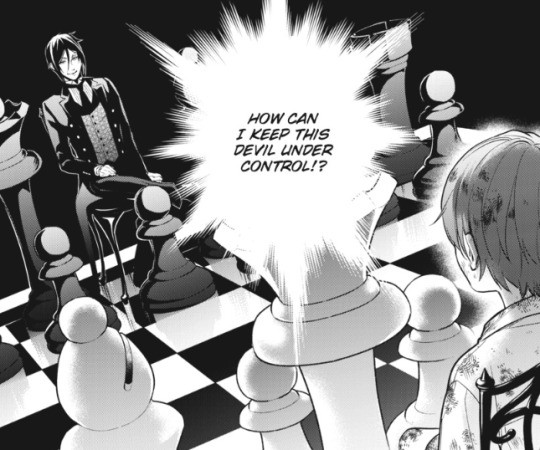
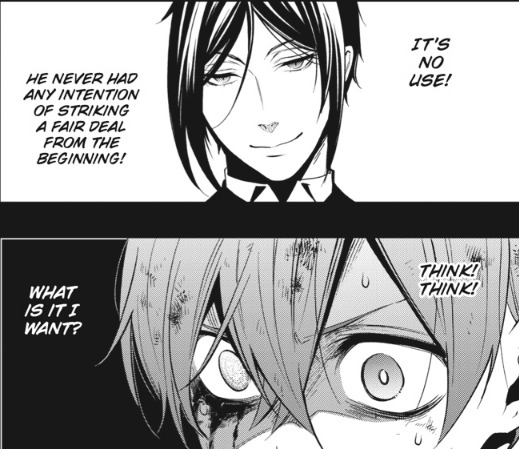
Sure, Ciel can believe in the 3 "wishes" he made when they were bound 4 years ago, but not in much else, as the Green Witch arc confirmed.
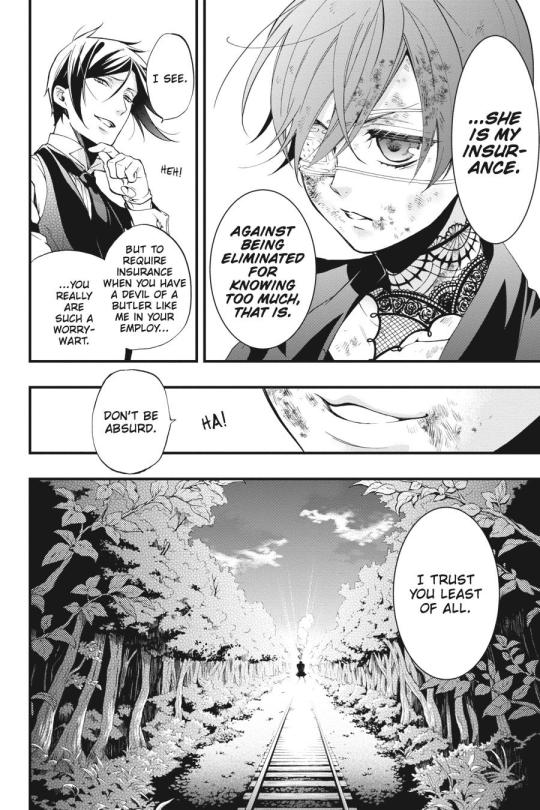
Meanwhile Seb is having fun playing the perfect butler our!Ciel wishes him to act as, while he waits for Ciel to find the targets of his revenge, but he's also terribly unforgiving if our!Ciel strays from their contract, because he's hungry.
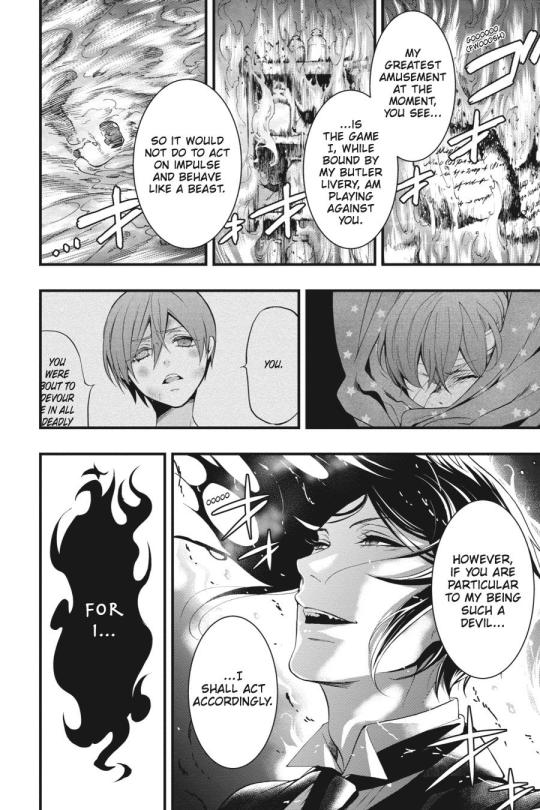
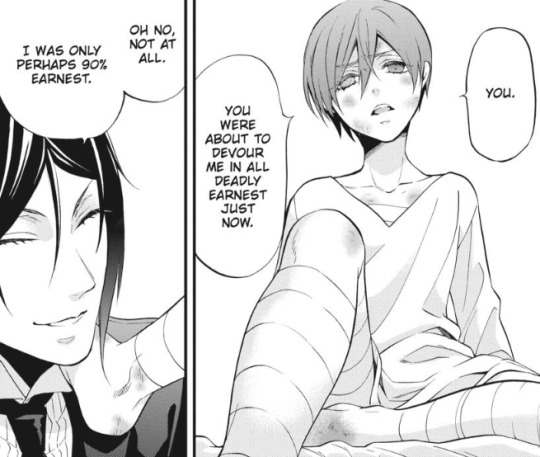
That's why it's such an interesting dynamic. To quote this post : "Kuroshitsuji wouldn’t be as compelling and enjoyable as a story if our!Ciel’s lack of self-worth and faith wasn’t supported by Seb acting as a catalystic abyss."
It's also interesting because I believe that the big bad is another human/demon duo that have been bound for a much longer time and that probably "works" in a very different way, considering that Victoria may not have "tamed" John Brown the same way (if at all) :

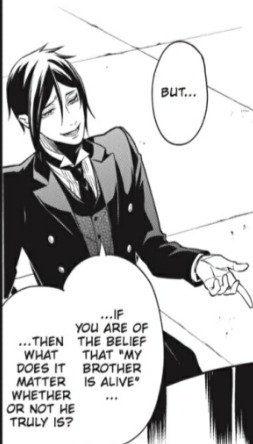
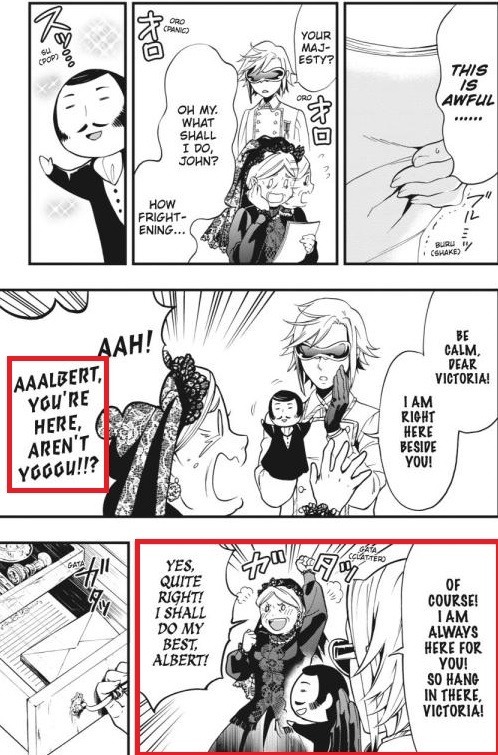
Speaking of which, this is probably also why, to directly answer your third question, Seb barely reacted when Brown showed up in Germany, despite the poisonous gas in the forest.
The thing is, I wouldn't be surprised to find out that Seb and Brown recognize each other as demons, but have no reason to fight and get in each other’s way, as long as their respective masters don't order it.
In the words of Jane, whom I believe is John, when Mey offered her to work at the household, I think demons might see each other as “coworkers”...
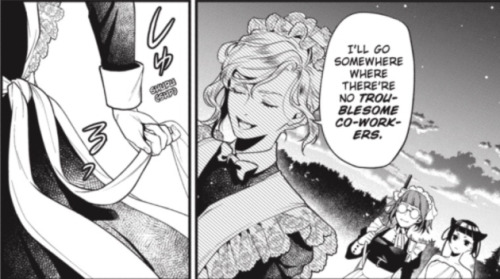
After all, nothing is more important for demons than having a good meal so, as long as their contracts assure them delicious souls, Seb and Brown will work on "cultivating" the souls they're bound to eat. To quote Seb himself :

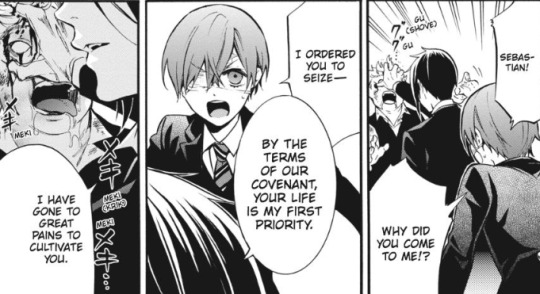
All that to say, I do believe that Jane/John is the type of greedy and gluttonous demons that Seb finds not elegant (from ch138) whereas Jane/John seems him as troublesome, since Ciel and Victoria are building to become enemies.
Lastly, this on-going distrustful chess game between Ciel and Seb will probably at some point lead our!Ciel to reconsider whether or not losing his future, life and soul for revenge is truly something he wants, thus leading to a possible conflict arising between Seb and Ciel (similar to what happened when Ciel had PTSD during the Green Witch arc), since the story thematically presents revenge as the wrong choice to make (or, rather, as the choice to make for the wrong reasons).
That's all part of why their dynamic is such a compelling plot point, in my opinion. :)
Finally, about your second question, no one really knows if this scene...
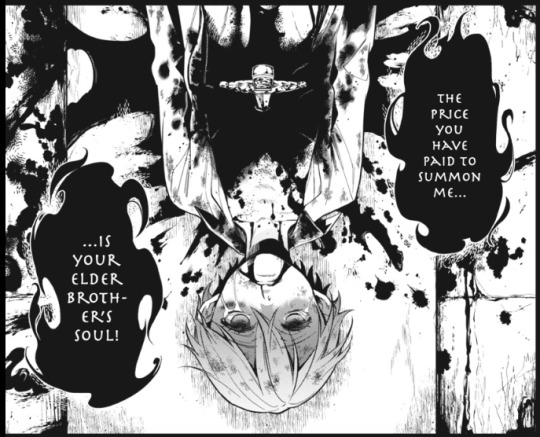

...meant that Seb devoured real!Ciel's soul 4 years ago. ¯\_(ツ)_/¯
Some fans say yes, some fans say no, I think it's definitely left ambiguous by Yana, but it could also just be that real!Ciel's soul was cursed to rot in Hell forever. I don't know, Yana doesn't give us enough about demonology lore in the series to be sure for now.
Either way, I don't think it matters that much. Maybe it can explain things such as how Seb rebuilt the manor as an exact replica from before the massacre, but I don't think it means Seb knows who the targets of Ciel's revenge are.
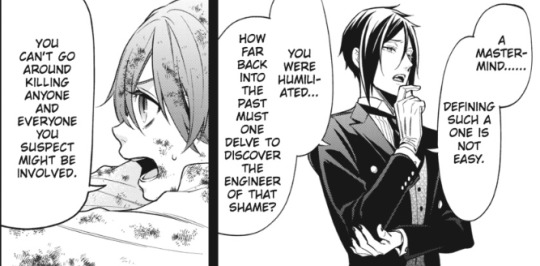
And even if it did, the contract vouches that Ciel finds out the truth by himself...
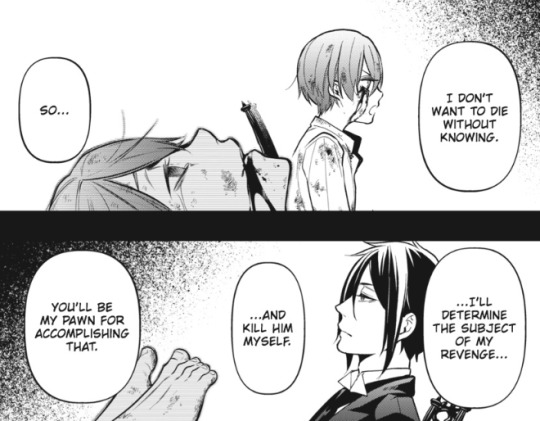
...so again, the only guarantee we have from Seb's words is 1) that real!Ciel has no soul and 2) that, unlike most people who die, the Shinigamis probably didn't collect it when he was killed, because it was used/eaten as "fee for Seb's crossing" (unlike our!Ciel who still has a soul, but a doomed one, bound by a contract as payment to a demon).
Finally, real!Ciel's soul not being collected by the Shinigamis, but being eaten by Seb or rotting in Hell, will probably become relevant once we figure out what the BD project is currently trying to pull…
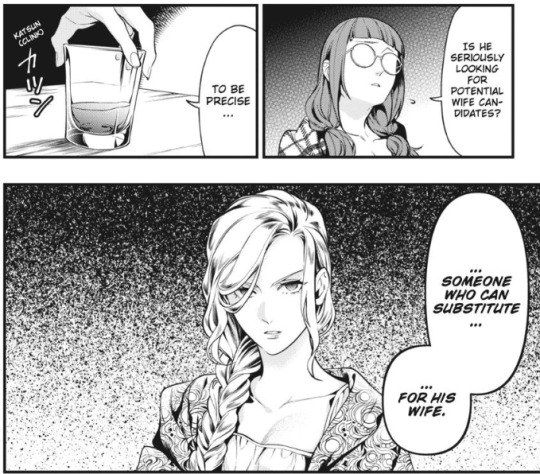
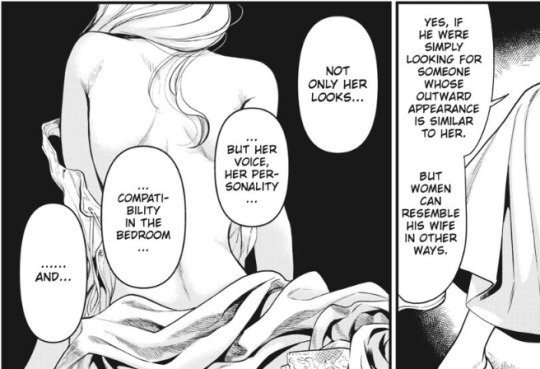
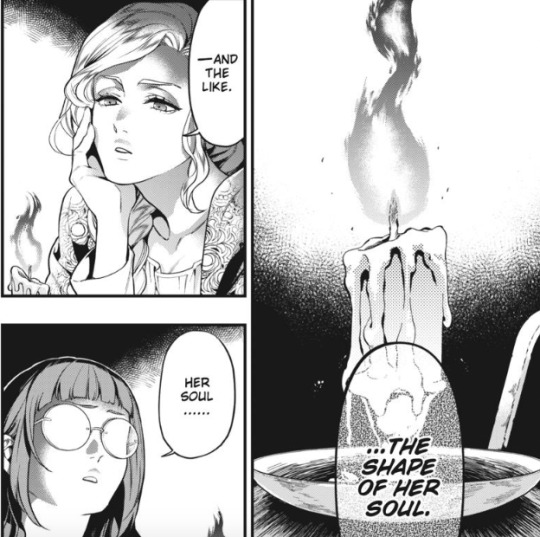
…with the “shape of the soul” new concept.
I hope it answered your questions ? Thank you again for your nice words ! I wish you a nice day, Anon. :))
#kuroshitsuji#sebastian michaelis#ciel phantomhive#queen victoria#john brown#2CT#kuro138#kuroshitsuji theory#anon#answers#my analysis
29 notes
·
View notes
Text
well anyway i don't see adwd!theon's time in winterfell as a reckoning to the tune of too late does this heedless villain see the error of his ways or any such narrative justice. personally i find it the most thematically interesting and, stay with me here, hopeful of theon's three "returns" i.e. his return to pyke, his acok return to winterfell, and finally the adwd return in question. this probably hinges on how of late i've grown more comfortable identifying winterfell as a decimated metropolis, yet a thriving necropolis—a place where the dead have been dead longer than the living have been living. without getting too much into that, i'll leave it with how siri hustvedt paraphrases lewis mumford: "people want to live close to the burial places of their ancestors, to whom they are drawn with mingled feelings of worship and dread, and that is how the city is born."
in acok, winterfell died when it was divested of starks (a symbolic death of winterfell as there are none left to inherit it) and burnt to the ground (a physical death). my point in all this is to say there is mutuality, a symbiosis that characterizes theon's third and final "return." he comes as reek, horrified to hell by ramsay and roose. theon's dehumanization has taken from him both a physical identity—his looks have changed so drastically that he is unrecognizable—and a metaphysical one—he is no longer afforded even the nominal identity of theon greyjoy. the reason i keep putting return in quotes, which i will now stop doing, is because obviously that's a myth. in reality, return occurs in the memory, and if memories contradict then returns cannot happen even there. theon cannot go back to a time prior to his torture. on pyke his family rejects him ("your blood and your heir." lord balon grunted. "we shall see."), in acok winterfell refuses any memory of him in lieu of classifying him as an invader (she gaped at him as if he were some stranger), and in adwd he remarks that winterfell is no longer "the castle he remembered from the summer of his youth." there are no homecomings.
however, a big thing that occurs in adwd is that we see both theon and winterfell being raised back to life. these two plots are connected or perhaps even the same. reek is forced to reclaim theon greyjoy in order to renew the stark claim via jeyne-as-arya. by doing this, by becoming theon, the stark return is recognized, and winterfell is revived. the proof is in the pudding: winterfell rapidly becomes a site of conflict thanks to it's value being restored. we see that jon is unwilling to renounce his vows in order to be named lord stark until the situation with ramsay and jeyne-as-arya comes to a head. elsewhere in the north, it's suddenly time to dust off those banners and rescue valiant ned's precious little girl. wyman manderly makes his way to winterfell only after sending davos on a quest to retrieve rickon stark. in each case, it requires a living stark to make winterfell any sort of prize.
back to theon. thanks to a nifty sidequest with barbrey, theon is also the one to find the entryway to the crypts, which represents a limb of sorts to the structure of winterfell. he is the one the heart tree speaks to. two bodies destroyed yet they know one another / know each other's names. what does the beating heart of winterfell say to him? "theon." what does he say back? "the old gods... know me." okay. self-recognition through the other. love it. love it so much in the face of that whole spiel tyrion once gave:
Tyrion had only the vaguest memory of Theon Greyjoy from his time with the Starks. A callow youth, always smiling, skilled with a bow; it was hard to imagine him as Lord of Winterfell. The Lord of Winterfell would always be a Stark.
He remembered their godswood; the tall sentinels armored in their grey-green needles, the great oaks, the hawthorn and ash and soldier pines, and at the center the heart tree standing like some pale giant frozen in time. He could almost smell the place, earthy and brooding, the smell of centuries, and he remembered how dark the wood had been even by day. That wood was Winterfell. It was the north. I never felt so out of place as I did when I walked there, so much an unwelcome intruder. He wondered if the Greyjoys would feel it too. The castle might well be theirs, but never that godswood.
so yes. i am contextualizing theon's final return as a rebirth, actually. worship and dread.
229 notes
·
View notes
Text

Well, it speaks to a wider problem in fandom, and -- I've gotta tell you guys -- I have taken so much psychic damage since Separate Ways came out as I've come to learn just how functionally illiterate the generation after mine is. People in this fandom don't know even the most basic aspects of storytelling.
The reason why Ada doesn't help Ashley remove Leon's plaga is because it would be thematically inappropriate for her to do so.
Storytelling is about more than just being factually logical. Does it really make sense for 120lb Ashley Graham to lift Leon's 250+lb ass with 100+lbs of gear on him and put him in the chair in Luis's lab? No. But that's not the fucking point of the scene. Ashley doing it on her own serves a thematic function and also helps reinforce the change she underwent as a result of her character arc.
So, let's start at the beginning:
What is a theme?
A theme is a central concept that binds the characters, the conflict, the plot, and the story's progression together. It's something that all of the major characters have in common and also exists as an undercurrent to the plot.
People in this fandom, by and large, have been able to pick out the concept of "can people change" as RE4make's theme, because it's the one that's the most explicitly stated as the word gets spoken out loud over and over and over again.
But RE4make has more than one theme.
Another one of RE4make's themes is "the importance of/power in being part of a team."
Teams can form in the unlikeliest of places.
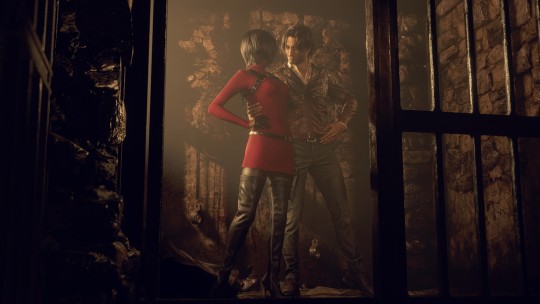
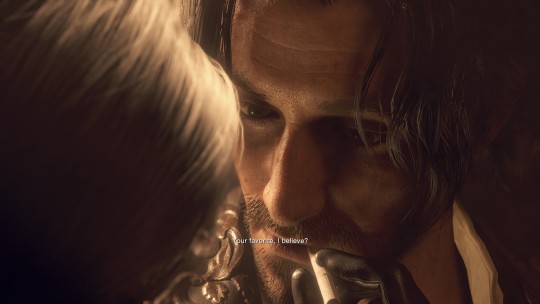
Sometimes, a team is a group of weirdo scientists doing vaguely evil shit at a secret lab in Europe.
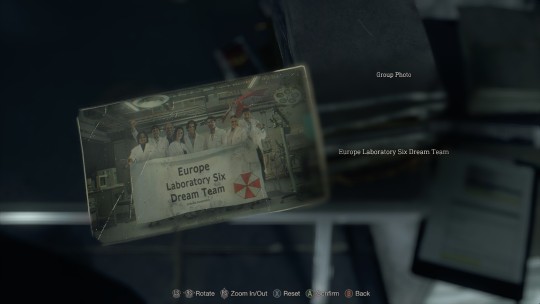
Other times, a team is an actual full military unit.
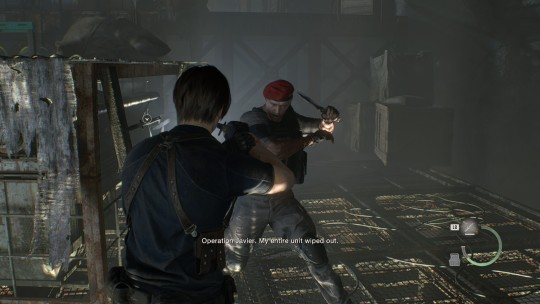
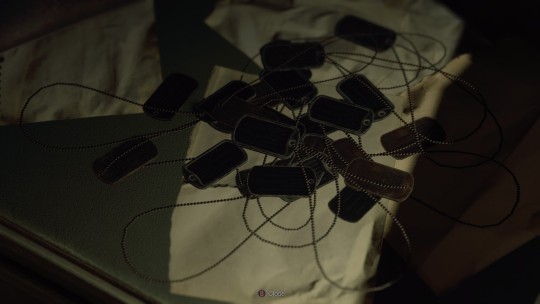
A team can be a religion.
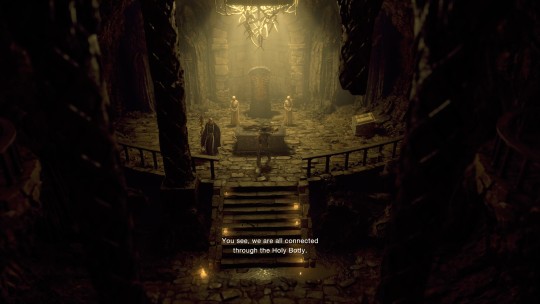
Sometimes, a team is a giant walking erection megalomaniac and the spy who works for him.
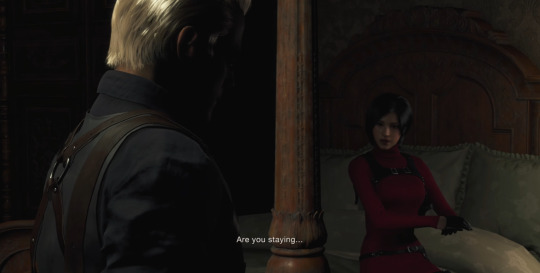
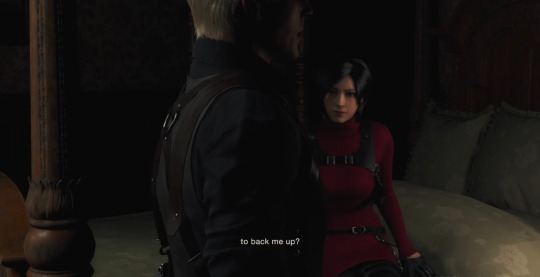
And sometimes
Maybe sometimes
A team is the most skilled combat unit the US government has ever produced and a tiny blonde college girl.
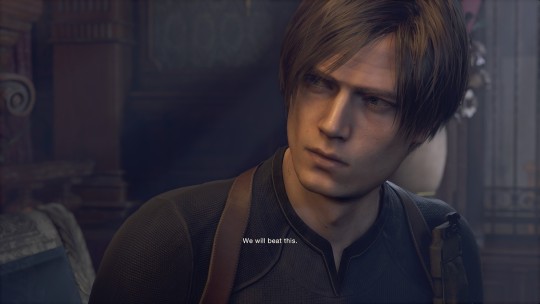
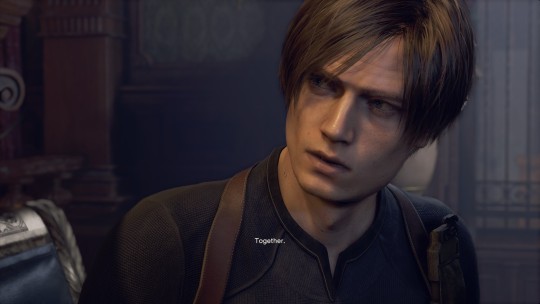
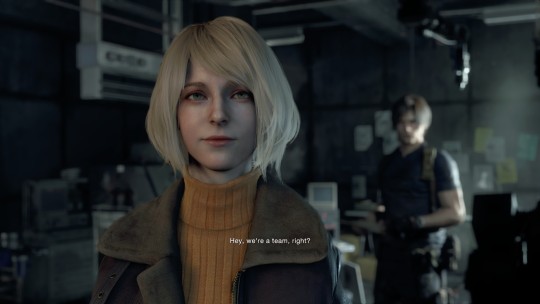
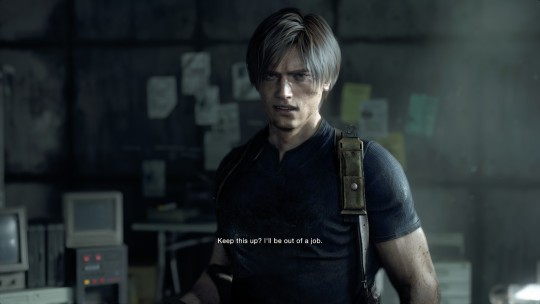
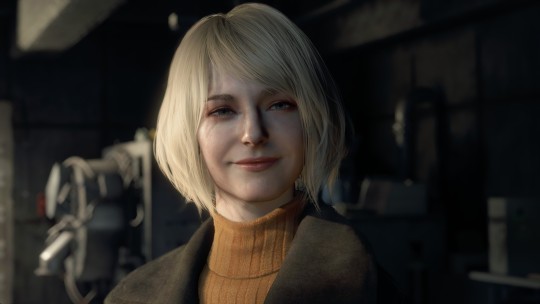
The point is:
Ada's not part of that team.
At no point is she ever established to be part of that team. Separate Ways shows us that any time she helped Leon, it was either incidental or for the explicit purpose of furthering her own goal/ambition/interests.
Leon and Ashley are able to remove each other's plagas because that's the power of the team that they've formed. They got there by lifting each other up. Ashley couldn't have made it without Leon, sure, but Leon also couldn't have made it without Ashley.
The matching scars that Leon and Ashley end up with as a result of their radiation surgery are different from the matching scars that Leon and Ada have.
Leon and Ada's scars are a symbol that they once carried the same burdens.
Leon and Ashley's scars are a symbol that they once carried each other.
And that's a huge fucking difference.
Ada has no place in that scene, in that lab, on that team. She just doesn't. If Ada had poked her ass into that scene, it would've destroyed the thematic payoff for Leon and Ashley's teamwork thus far.
That's the point of her watching the "For Luis" scene play out. She realizes in that moment that she's not part of that world, and she starts to understand, in that moment, why Luis's dying wish was for her to help Leon.
Luis had just found his new team, and he'd let them down. His dying wish was for Ada to fill in. And Ada made a good substitute.
But that's all she was.
And because all she was was a substitute, she had no place in that lab -- because Luis was with them in the lab already. ("All of this... This was Luis?" "Yeah. We're alive, thanks to him.") Maybe only in spirit, but he was still there.
So what use would his substitute be in that scene?
84 notes
·
View notes
Text
i'm gonna lie awake thinking about mouthwashing actually because there are so many things about the game that just hit me as so thematically interesting and i don't really have conclusions about anything yet. i'm still putting the cork board with string together. so this is just like a. vomit word salad of stuff i noticed and thought was interesting. as like a manual cyst draining. so that it doesn't clog up my brain and prevent me from sleeping.
first and foremost i definitely need to replay it because there's a bunch of stuff i know i missed the first time through or didn't make solid connections with.
a couple things immediately stick out to me tho
spoilers under the cut
1) vision and audience is obviously really important. there is an eye on the front cover of the game. but i think it's really interesting just how many things actually revolve around what is seen vs. unseen, who sees and what they see, and how what is seen alters reality.
like first of all there are no windows a la iron lung. the only things we "see" about the outside world are represented on displays rather than via pictures or out of windows. the only thing that comes even close to accurately being a picture representation of "outside" is the display in the cockpit, in the seat of power, that shows the collision. everything else is some false representation of "outside" - a weather display, a cartoon, film reels of the past, a commercial for mouthwash showing real trees that conflicts harshly with the art style of the characters' realities.
the characters' lives are restricted to what they see and what they see is only their immediate surroundings. this is their whole world. and it's constricting and breaking down toward an inevitable terminus in either the crash or their layoffs. there is nothing outside the ship. and it's only in the cockpit that there is a small tiny hole that peers out into a slightly expanded universe. but this isn't really that much more of a pov - after all it's only a small, clunky monitor display and it only shows death.
the codes are an extension of this, as is the communication from corporate - only the captain can see the full picture of reality, but this is an illusion of power rather than actual hierarchy. what is seen is still being limited to what the captain is allowed to see by corporate. some artificial sweetener and a layoff notice.
jimmy falls prey to this illusion of power and is desperate to achieve it, but he never really gains even that full vision. as he moves around the ship, things shift into darkness and escape his line of sight. pitch black surrounds him. he can't see into the utility room. he can't see daisuke after he crawls into the vent. he can't see anya and curly in the med bay when the door is closed. there is that section where they're looking for the disinfectant when the whole section of the med bay is just denied from vision.
even in the moments of his terror, vision remains an extremely important motif. the monster that chases him is blind, embodying this fear of sightlessness, the graveyard scene with swanesa is a game of constantly trying to keep him in your sight, the part where you can only walk backward without looking behind you, the ultrasound! everything is about seeing and being seen and the futility of his attempts to exert control via vision.
also love the way other characters exert control over vision - swansea with utility and anya locking away the gun and locking the med bay door.
meanwhile, curly, lying immobile in the med bay, with no autonomy to speak of sees EVERYTHING. he has nothing BUT vision. the moment when jimmy is talking with anya in the hallway and you can see curly staring at you through the frame of the doorway is what really hit me first about this because it's such a powerful image. he sees what anya does in the med bay, he sees daisuke crawl out of the vent. the whole time, he watches, and retains power over jimmy by seeing him for what he really is.
ironically the moment when curly's vision cuts out is only at the very end - jimmy moves off screen, the gas takes him, his future is entirely out of his control and there is nothing left to see.
and then of course there's a whole ADDITIONAL layer of what the characters see vs. what the player is allowed to see as in the pill feeding scenes. and where that line is even drawn.
2) swansea and the axe. thoughts on this one are limited at the moment but there's such a parallel between swansea breaking the fake screen display and specifically axing daisuke in the face (after telling him to close his eyes, hello....) and breaking through the cockpit door and on the other hand the instances where the axe is used to break through the foam which is the only thing keeping them all alive. i'm not quite there yet i am PERCOLATING.
3) anya had been clearing jimmy's psych evals for 137 days. at some point she had to make the decision to clear his psych eval even though she obviously knew there was something deeply wrong with him. lots to discuss here but this is one of those um. gladiatorial operations where you have to multitask delicately cutting open the patient and also stabbing people who look like they might want to talk shit about anya.
4) some biblical stuff came to mind but i dont wanna talk about it i think its lame and boring
5) mouthwash as false cleanliness and consumption as complicity. anya specifically overdosing on the mouthwash is really important although i'm not all the way there on this one either. i think it's a symbolic stand in for jimmy's false atonement that doesn't help or change anything - anya suffocates in it. (his extreme resistance toward bearing the burden of consequence and his need to veneer it over with a cheap form of "responsibility" as atonement. this all loops back up to 3.) and then the mouthwash failing to clean daisuke and only dirtying swansea (who becomes visibly, physically dirty as he consumes it).
but also consumption as complicity i guess is not the exact right phrase. it's more like consumption as bond. the cake binds them, the mouthwash binds them, curly's leg binds them. but it also separates them. swansea is separated by the cocktail and curly is obviously separated by the painkillers.
okay anyway probably not all i have to say but i ran out of words and it's well past my bedtime.
10 notes
·
View notes
Text
RWBY Volume 9 "Epilogue" Thoughts
youtube
So, here it comes an extra volume 9 animatic "epilogue" and I wanted to share some thoughts and a brief analysis.
General Thoughts
I really really liked it!
I am happy the Atlas refugees are having problems to adapt and that the Schnee Family has to face their privilege head on
It not being included in volume 9 works better for me because its contents can easily be re-arranged at the beginning of volume 10. In my opinion the story flows better this way (only my 2 cents though)
I am neutral to Raven's appearance.
On the one hand I hope the conflict between her and Yang is not solved too easily (I also think Yang hiding the Spring Maiden identity should be addressed). On the other hand her appearing at the beginning of the new story arc solves several things. She can make progress early on, so that the focus can then be given to other characters. Moreover, she can reveal what happened between her and Summer. If this mystery is solved, then there is more time to focus on Summer's return (either as a Grimm, a human or in some kind of symbolic way). In short, it can all lead to very thight writing, so I approve.
As for people wondering if the story was changed since RWBYJ leave the Ever After on their own... we can't say, but personally I never felt Raven saving them from the Ever After really worked thematically and I don't think it is what the epilogue implies. After all, before the video they say they deleted some scenes which tie with volume 10 plot. I think RWBYJ's meeting with Raven is one of these. Nonetheless, I am happy if we get our "Spring leading to Summer" symbolism. (Which really works on multiple levels doesn't it?)
In any case, I think Raven simply senses Yang is back and goes to meet her. Then she leads them all to Qrow. This in itself is a significant improvement for her. Still, it makes sense if Raven thought Yang was really dead. It can work as a final callout and a consequence of her actions. Yang outright asks Raven to choose between herself and her daughter and Raven makes the selfish choice. As a result, Yang dies. It is no surprise then that Yang coming back is seen by Raven as a final chance to do the right thing.
Speaking of people dealing with grief and loss, here we come to the heart of the new content and the focus of this short analysis.
Winter and Qrow - Grief
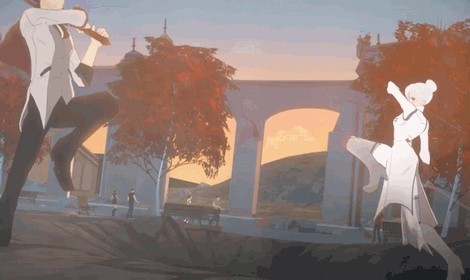
So, the heart of the video is really the foiling between Winter and Qrow. This is interesting in itself because these 2 characters are tied together since their first appearance in volume 3:
Qrow is Ruby's mentor
Winter is Weiss's mentor
Both girls look up to them and try to imitate them. Still, this changes with time as both Ruby and Weiss grow until they are able to inspire Qrow and Winter back.
Here, we see exactly this, as both Winter and Qrow talk to the two girls in their minds (Qrow is talking to all of them, but the foiling is between Weiss and Ruby and thematically the focus is on Ruby anyway). Still, their thoughts are complete opposites.
On the one hand Winter focuses only on the problems and sees no beauty at all.
Winter: "But no amount of determination or hard work will change where we find ourselves now. What do you do when there is no hope left?"
On the other hand Qrow is conscious things are bad, but is full of hope.
Qrow: Call me crazy, but I am actually feeling a little optimistic about things. I figure... Don't get me wrong...It's bad. In fact it'd never been worse. And yet, you can still see the goodness in all things. Acts of kindness, people trying to atone for past wrongs.
This ties to their 2 different ways of mourning.
Winter: "You and your friends did all you could to save the world. You would be so disappointed in us. Maybe it's for the best you don't have to see this Weiss" > She is looking at the memorial monument, where it's written "Don't come back"
Qrow: "Things may be bad, but my biggest regret is that none of you are here to see the good that you started because you did start something." > He cries while looking at a picture of Ruby that says "Remember her message"
Winter thinks it is best that Weiss isn't there to see that everything was useless. Qrow instead wishes the kids were there to see that the world is changing. These behaviours aren't limited to Winter and Qrow's feelings over the protagonists, but they fit their reaction to another important loss they both faced:
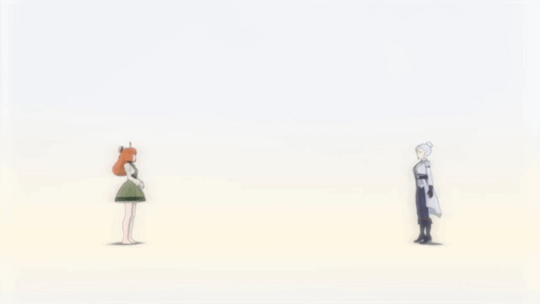
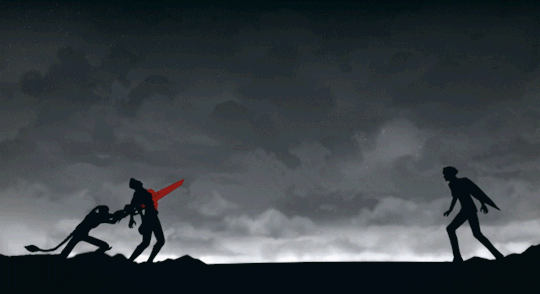
Penny and Clover's deaths have similar roles in Winter and Qrow's stories, as they are supposed to integrate with their lost loved ones. This is conveyed also through their respective powers:
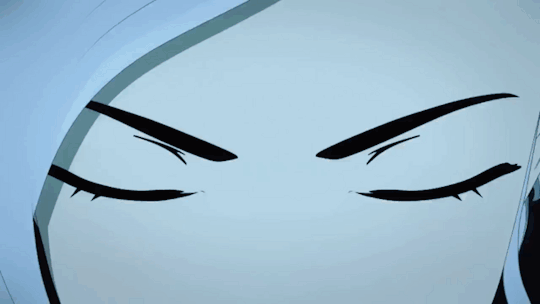
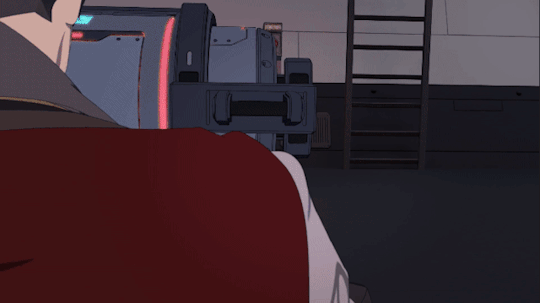
Winter inherits the Winter Maiden's power by Penny and Qrow's semblance evolves to become similar to Clover's. This shows Qrow has successfully integrated Clover's mentality into his own:
Qrow: Like an oasis in a desert, it's all a matter of perspective. You see, an old friend taught me that.
The same can't be said about Winter:
Penny: "I won't be gone, I'll be part of you."
Winter: "Because of me, Penny is gone. Forever."
As Penny herself states in her final goodbye, she isn't really "gone", as her legacy lives up in Winter. This means Winter should honor her will and adopt Penny's optimistic mindset. Still, Winter is doing the opposite. This is why she feels Penny is really gone forever.
In other words, Winter has understood rationally what a real Maiden should be like:
Winter: No, Penny. You were always the real Maiden at heart.
However, she still doesn't feel it in her heart. This is why probably she needs Weiss to finish her arc:
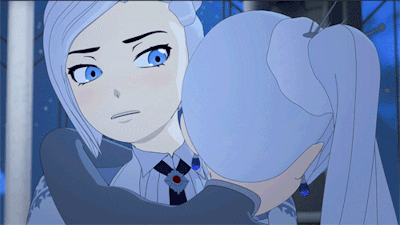
After all, Weiss is supposed to be Winter's second Gerda, which takes out the final cursed glass fragment from Winter's heart.
Qrow is instead close to the end of his arc, in my opinion. As a matter of fact he has already been inspired by Ruby:
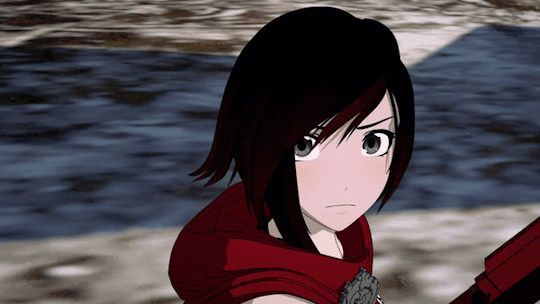
I think he only needs a top off, which will probably come with a final showdown with Tyrian, which will not be about revenge, but rather to save someone (probably Mercury).
What's important is that these 2 characters explore the theme of grief in opposite ways.
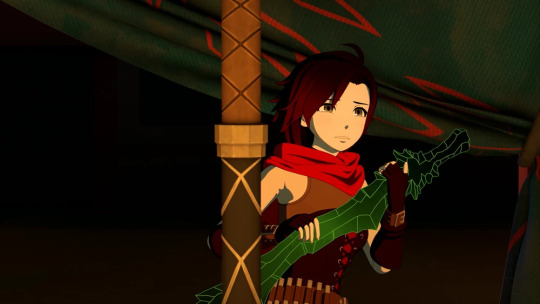
Ruby: I… I thought this was lost forever. How’d you have it? Blacksmith: Nothing. No one is ever truly lost.
Qrow understands the meaning of the Blacksmith's words, whereas Winter doesn't. The Blacksmith conveys to Ruby that all the people she lost are still parts of her. This is why she keeps finding Penny's sword over and over. It is because the hope Ruby saw in Penny is really just a part of Ruby herself:
Jinxy: Enough hope to fill this jar.
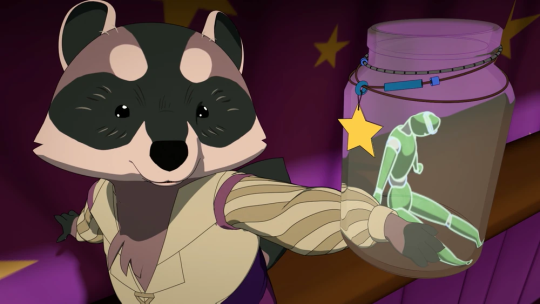
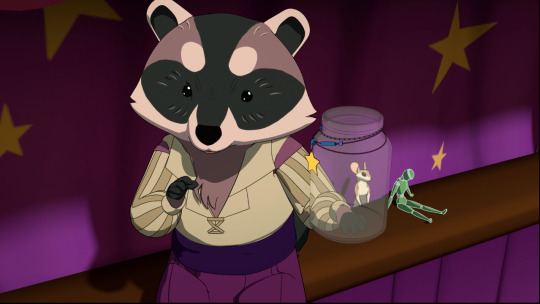
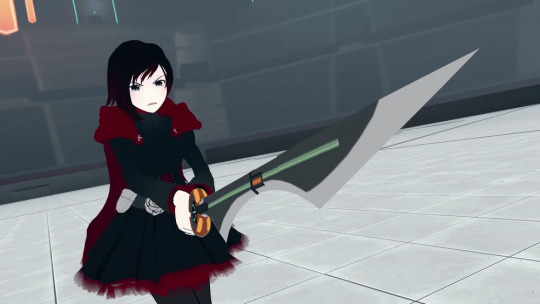
Ruby fights a Nevermore (grief) by using Penny's sword (hope).
Similarly, Qrow's sense of belonging and his wish to do good don't go away with Clover's death. If anything they are parts of Qrow that Clover made emerge. Thanks to the Lucky Fisherman, Qrow has now the right framework to show them to the world.
Winter too has in herself the heart to be a Maiden like Penny. She too has one of Penny's swords inside. She is just not looking at it out of self-hate and guilt. Luckily she is now surrounded by people who love her and they will hopefully help her take a closer look at the mirror.
#rwby#rwby volume 9#winter schnee#qrow branwen#ruby rose#weiss schnee#raven branwen#greenlightvolume10#rwby meta
140 notes
·
View notes
Text
Mauler (Pathfinder Second Edition Archetype)

(art by AnatoFinnstark on DeviantArt)
Sometimes an archetype is an expression of a thematic idea, and sometimes it’s simply a specialization in a particular field. Today’s subject is the latter.
There is just something to love about really big weapons. Perhaps it’s the might required to wield them, or the potential for destruction that they have. Leverage and momentum demonstrate that you don’t have to swing repeatedly or precisely to deal a lot of damage.
And so, if you’re playing a martial character with an interest in wielding big two-handed weapons, be they mighty maul, greatsword, or any variety of polearm, the mauler archetype may scratch your itch, offering a few mainstays from the fighter plus a handful other feats specialized in bringing out the most in your large, imposing weapons.
This archetype is useful as it offers a way to specialize in bigger weapons with some of the fighter-specific mechanics like flourishes and presses without having to cross-class into fighter, plus having tricks unique to the archetype. This means that any sufficiently martial class or character can make use of it as long as they meet the strength prerequisite, be they barbarians, champions, fighters, rangers, or even odd picks like an inexorable iron magus. If you plan to wield a weapon that can only really be effectively used with two hands, this archetype can certainly provide.
The base dedication of this archetype grants greater skill with two-handed weapon if the warrior didn’t already have it.
With a mighty blow, many learn to knock their foes off their feet with an upending strike. A later feat makes it more certain that foes take a bad fall from the strike, and improve the damage caused.
For the cost of accuracy, many also learn the fighter trick of dealing devastating blows at the cost of unbalancing themselves.
Even when not using the deadly edge, the weight of their weapons allows them to shove aside foes and move forward.
That pushing also can knock foes off course if they try to move through the mauler’s reach.
Not even the protection of armor can fully save foes from these mighty warriors, and with the final blow of a combo, they can deal massive damage, or a reduced amount if the armor holds, crumpling it under the weight of the blow.
With a mighty blow directed to the ground, these warriors can shake the earth and potentially knock multiple foes off their feet.
They can also learn to shove or knock over foes with a mighty, inexorable sweep as well.
Finally, they can instead unleash powerful sweeping blows or a hammering faster ones to pound every foe within reach under a hail of strikes.
If you want to focus on tripping and dealing heavy damage with a two-handed weapon, this archetype might be for you. It is a bit trickier to use with the magus due to their spellcasting taking up a sizable, conflicting chunk of their action economy, but with the right buffing magic beforehand you can potentially make this relentless destroyer even mightier. So yeah, do some digging and see what sort of martial classes will work best with this archetype, even if you only take a handful of tricks from it.
There really is no lore associated with this archetype, so you can come up with any reason why such characters might specialize in such heavy weapons. Perhaps their strength made them suited for training as line-breakers, or maybe they took polearm training very seriously, or maybe they aren’t military at all and just really, really like big weapons.
In the land of Be’Sha, humans and wood giants live alongside each other in harmony, tending herds of hadrosaurs in a pastoral existence. That isn’t to say that it is entirely peaceful, for even these shepherds must tend to their flocks, and they tend to protect their charges with massive weapons, polearms for humans, stouter, heavier weapons for the giants.
Many legends speak of masterful tengu swordsmasters possessing unparalleled skill with a blade, and such is the case with Kurumo, champion of the mountain god and master of using an odachi katana without assistance. He travels the mountain roads, driving off bandits and tending to the needs of mortal and kami alike.
While plying the ruins of an ancient city, the party comes across a mural of a past champion of an arena that once stood in the reason, a figure wielding a mighty maul. All of this would be impressive and interesting already, but said figure also is depicted with the same strange sigil marked on their wrist as one of the party members.
13 notes
·
View notes